FOLLOW THE LEADER/ Masters. Mindsets. Milestones. P.19
#DRIVENBYWOMEN/ An Emirati Women’s Day 2025 Campaign P.61

FOLLOW THE LEADER/ Masters. Mindsets. Milestones. P.19
#DRIVENBYWOMEN/ An Emirati Women’s Day 2025 Campaign P.61

HOW e& GROUP CEO BET THE FUTURE ON REINVENTION – AND TURNED A REGIONAL TELCO INTO A $20B GLOBAL TECH PLAYER. P.20 HATEM DOWIDAR
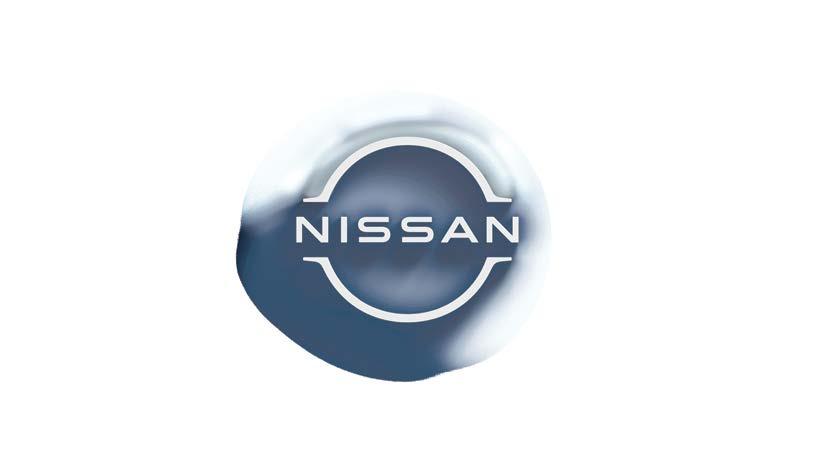


e&’s Group CEO Hatem Dowidar on charting a new course for what a global technology group can become.
30 H.E. Najla Al Midfa Vice Chairperson, Sharjah Entrepreneurship Center (SHERAA) Vice Chairperson and Managing Director, EMIRATES GROWTH FUND (EGF)
34 Mete Güney Executive Vice President, Market Development, EEMEA, MASTERCARD
38 Amna and Hamda Al Qubaisi Emirati female professional race car drivers
40 Halima Jumani CEO, KIBSONS
46 Karim Dakki Co-founder and CEO, KLAIM
50 Hassan AlFarsi Vice President, DUBAI INTEGRATED ECONOMIC ZONES AUTHORITY Julien Plouzeau Senior Partner, ORASEYA CAPITAL
54 Charlie Wright Founder and CEO, HUMANTRA

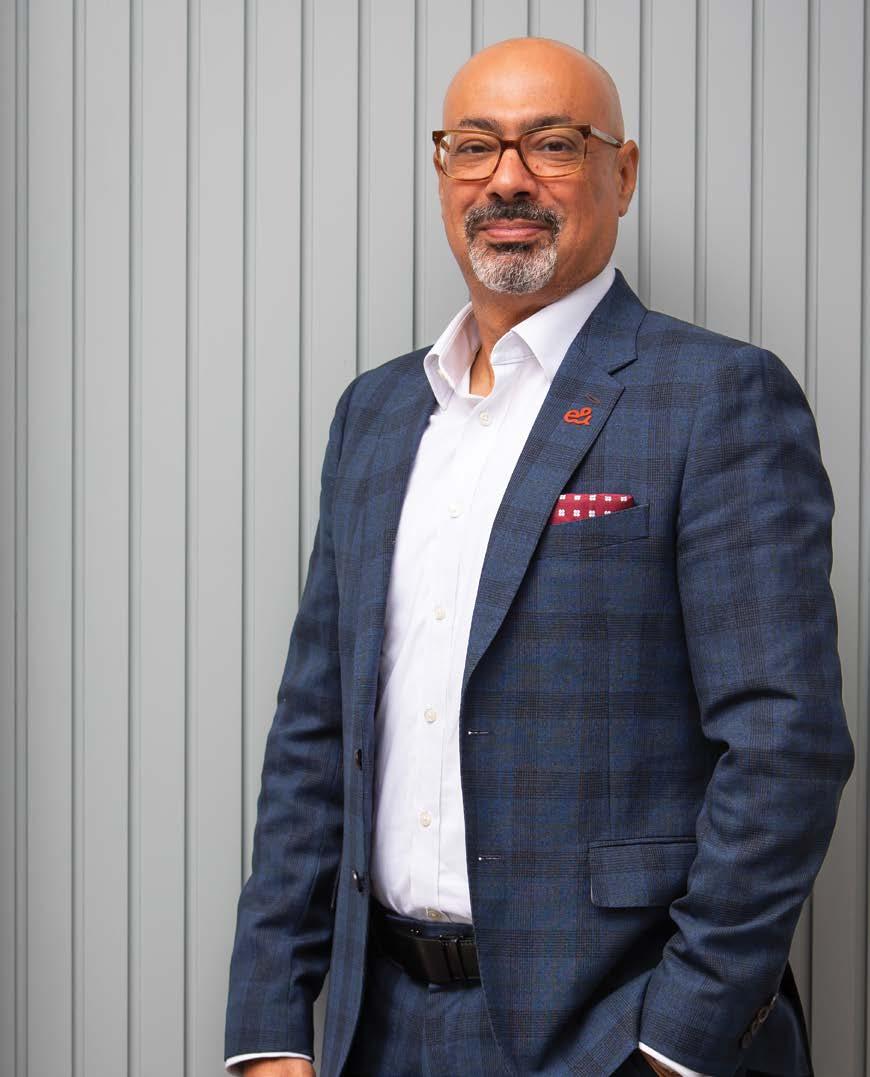




Step into a world of opulence when you book a Suite at Raffles Doha.
Experience the added luxury of QAR 750 credit to spend on dining in the hotel, and QAR 500 towards any Spa treatment.
Children aged 12 and below are welcome to indulge in the enchantment of complimentary dining.
Rates starting from QAR 3,500 per night
For reservations, please call +974 4030 7100 or email reservations.doha@raffles.com


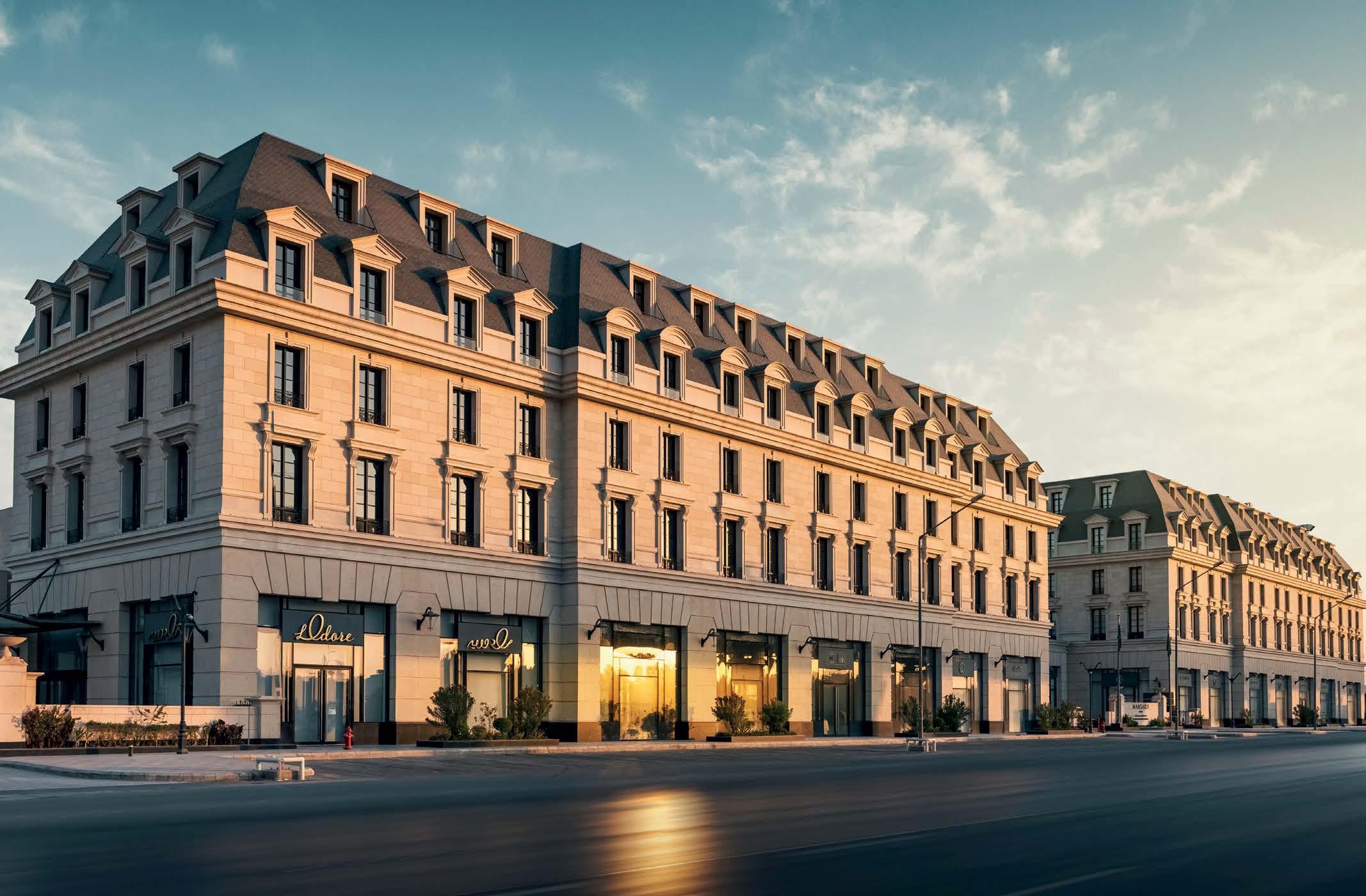




78 Human-First Banking How banks should approach digital transformation
15 More Than a Move How Cosmetic PR founder LUCY HILSON built meaning and momentum in Dubai.
80 From Dubai to the World Lessons in taking an Emirati brand global.
82 From Gadgets to Greenhouses
ROHIT BACHANI on building the Merlin Group
CEO Wissam Younane wissam@bncpublishing.net
MANAGING DIRECTOR Rabih Najm rabih@bncpublishing.net
ART DIRECTOR Simona El Khoury
EDITOR IN CHIEF Anil Bhoyrul anil@bncpublishing.net
MANAGING EDITOR Tamara Pupic tamara@bncpublishing.net
FEATURES EDITOR Aalia Mehreen Ahmed aalia@bncpublishing.net
REGIONAL DIRECTOR
Mahdi Hashemi mahdi@bncpublishing.net
DIRECTOR OF INNOVATION
Sarah Saddouk sarah@bncpublishing.net
GROUP SALES DIRECTOR – B2B GROUP Joaquim D’Costa jo@bncpublishing.net
HEAD OF PARTNERSHIPS Samir Glor Samir@bncpublishing.net
COMMERCIAL LEAD Anna Chipala anna@bncpublishing.net
COLUMNIST Tamara Clarke
CONTRIBUTING WRITERS
Justin Harper, Dr. Bernd van Linder, Mohamed Al Falasi, and Fida Chaaban.
SUBSCRIBE
Contact subscriptions@bncpublishing.net to receive Entrepreneur Middle East every issue
COMMERCIAL ENQUIRIES sales@bncpublishing.net ENTREPRENEUR.COM
Access fresh content daily on our website

Enlighten Your Eternal Beauty, Inside and Out!
@muarjewels www.muarjewels.com
info@muarjewels.com

In just a few short years, Abu Dhabi has transformed itself into one of the most exciting global hubs for technology and innovation. At the heart of this transformation is Hub71, the emirate’s ambitious tech ecosystem launched in 2019 with the backing of Mubadala Investment Company and some of the world’s leading technology partners. What began as a bold vision has rapidly evolved into the Gulf’s answer to Silicon Valley—an environment where ideas, capital, and talent converge to build the future. Today, Hub71 is sharpening its focus on artificial intelligence and laying the groundwork for a major expansion into healthcare. This shift is not only timely, but also visionary. Across the world, AI is revolutionizing industries—from logistics to finance—but nowhere is the impact more profound than in healthcare. Abu Dhabi, with its strong healthcare infrastructure and commitment to innovation, is perfectly positioned to lead this global transformation.
By fostering AI-driven solutions in healthcare, Hub71 is setting the stage for breakthroughs that will improve patient outcomes, optimize hospital operations, and advance medical research. This is not just about technology—it is about empowering humanity.
Entrepreneurs working at the intersection of AI and healthcare will find Abu Dhabi to be fertile ground, where bold ideas can be tested, scaled, and exported worldwide.
The success of Hub71 is also a powerful job-creation engine. As startups grow, they bring with them a wave of new opportunities—not only for engineers and data scientists, but also for marketers, healthcare professionals, product managers, and the countless roles that a thriving ecosystem demands. This is the multiplier effect of innovation: one startup becomes ten, ten become a hundred, and soon an entire generation of entrepreneurs is fuelling a knowledge economy that stretches far beyond the UAE’s borders.
What makes Abu Dhabi’s approach unique is its ability to combine world-class infrastructure with a welcoming, globally connected environment. Entrepreneurs are not just finding a place to do business; they are finding a community that supports risk-taking, celebrates ambition, and invests in the future.
As Hub71 deepens its focus on AI and healthcare, it is clear that Abu Dhabi is not simply chasing trends. It is setting them. The emirate is showing the world that innovation, when combined with vision and commitment, can build a future full of promise, jobs, and opportunity.
Anil Bhoyrul Editor-in-Chief
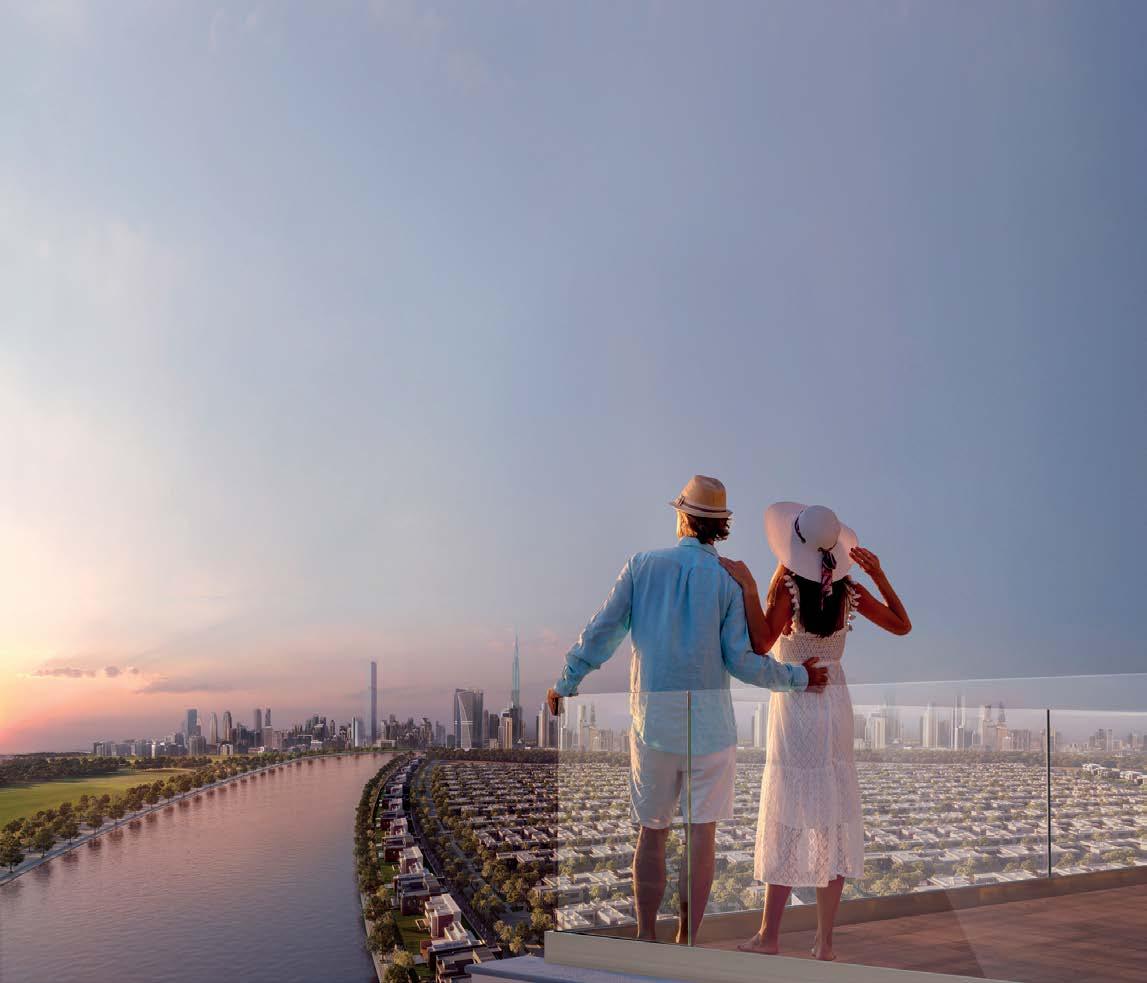


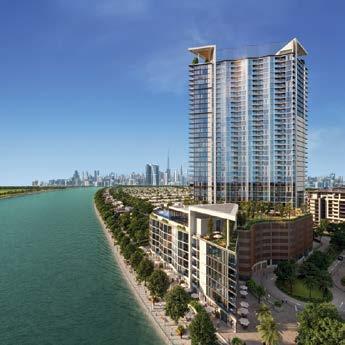






Rather than approaching the UAE as a temporary stop, Lucy Hilson decided to fully immerse herself in its culture, energy, and opportunities. Today, Dubai is her home and a base of her boutique PR agency Cosmetic PR. "In the UK, I’d built a respected agency with a reputation and steady inbound leads. Then, just like I did 11 years ago in London, I recognized that the aesthetics industry here was evolving fast, with new clinics, treatments, and professionals entering the space, but not enough strategic PR support to help them stand out. Here, I had to reintroduce myself, establish trust, and earn my place all over again. But that challenge also reinvigorated my hunger, it reminded me what I’m capable of building from the ground up.”
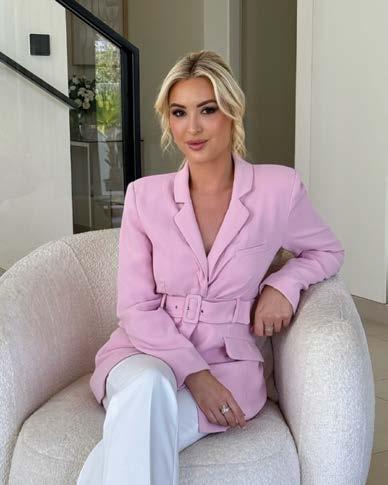
“
ONE OF THE BIGGEST MISTAKES I SEE IN THIS REGION IS EXPECTING INSTANT SUCCESS –A LOT OF PEOPLE WANT TO BUILD A BRAND OVERNIGHT, BUT REAL PR TAKES TIME, CONSISTENCY, AND CLARITY.”
Cosmetic PR specializes in public relations for the aesthetics and wellness sector, representing aesthetic doctors, cosmetic surgeons, skincare brands, medical devices, clinics, and wellness companies. This niche developed organically from Hilson's early foundation in spa and wellness PR, driven by a strong focus on treatment outcomes and tangible results. As the agency expanded into advanced aesthetics, it identified a significant gap in media representation—particularly in expert-led, credible storytelling.
"I’ve always believed in championing the people behind the procedures – the science, the results, the trust,” Hilson says. "Dubai’s aesthetic sector is dynamic and fast-moving. It’s not just keeping up with global trends – in many ways, it’s setting them. But with so many players entering the space, it’s never been more important to have a strong, strategic
communications presence. There’s a real appetite for visibility here – but visibility that converts, builds trust, and positions brands as leaders, not just noise."
In the UAE’s aesthetics sector, Hilson advises that effective communication strategies must be rooted in trust, expertise, and proven results. She finds the local audience highly discerning, with a clear understanding of the services and outcomes they seek. As such, traditional promotional tactics or overly commercial messaging often fall short.
"It’s not enough to just say “look at this transformation” – you need to explain how you got there, why it works, and who is behind it,” Hilson says. "Strategy-wise, I always encourage brands to think long-term. One of the biggest mistakes I see in this region is expecting instant success – a lot of people want to build a brand overnight, but real PR takes time, consistency, and clarity.”
Another piece of advice for her clients is to trust the process. "I always say: you're the expert in the treatment room, and I’m the expert in positioning you outside it. I know the formula that converts visibility into trust and enquiries,” Hilson explains. "So one of the biggest do’s? Trust the process. Let your PR team guide the narrative, shape the story, and build the momentum. And don’t try to do everything all at once – effective PR is never about noise, it’s about strategy.”
In a highly competitive market, Cosmetic PR distinguishes itself through a focused specialization in aesthetics PR. While many agencies group beauty, fashion, and wellness under a single umbrella, Hilson decided to focus exclusively on the aesthetics sector. "I understand treatments, techniques, downtime, regulations – and that’s why clients trust me,” she says. "This isn’t a generic beauty category. It requires precision, experience, and deep sector knowledge –and that’s what sets us apart.”
In line with that, she manages boutique teams across the UK and UAE in order to keep Cosmetic PR highly focused, close-knit, and resultsdriven. "My clients are trusting me with their visibility, reputation, and growth – so I’m closely involved in every campaign,” Hilson says.

"I’m the one with two decades of experience in this space, and I know that what converts isn’t generic exposure – it’s strategic storytelling with the right relationships behind it.”
As a founder in the fast-evolving PR world, she also needs to balance creativity with commercial demands. "In PR, creativity is what gets you noticed, but commercial clarity is what gets results,” Hilson explains. "For me, the balance comes from always tying big ideas back to business goals. It’s not about press for press’s sake – it’s about visibility that converts. Whether it’s a headlinegrabbing launch, expert opinion led features in top titles to build credibility and searchability, or a viral campaign – I always ask: will this build trust, drive bookings, or elevate the brand’s authority? In such a fast-paced industry, it’s easy to get distracted by trends or vanity metrics. But when you build strategies around impact, not ego,
that’s when PR becomes a true growth tool. I’m obsessed with both sides – the creative storytelling and the numbers that prove it worked."
Cosmetic PR’s next chapter is centered on strategic growth and evolution. Hilson says that, after years of refining what drives tangible results, her goal is now to scale that proven framework. "It’s about expanding that ecosystem that we have built. There’s a new focus on founder visibility, expert-led partnerships, and skin-first brand storytelling. I’m launching new ways of working that reflect how the PR landscape is changing – it’s not just about the press release anymore, it’s about how you show up across every touchpoint. And yes, we’re quietly expanding our international footprint too –growing into markets where aesthetic innovation is booming. I’ve always believed PR is about momentum, and we’re only just getting started,” she concludes.
}Just go for it – don’t wait for perfect. "The biggest mistake is waiting until everything is lined up. It never will be. You learn the most by doing – and momentum builds once you take that first step. You’ll figure things out along the way."
}Understand the market – it’s not the same as back home. "What works in the UK or the US doesn’t always translate here. The UAE has its own pace, culture, expectations, and consumer behaviors. Do your homework, adapt your approach, and be willing to listen and learn."
}Put yourself out there. "This is a city built on visibility and relationships. Be present – go to events, meet people, join conversations. The more you’re out there, the more opportunities will come your way. Networking here really does open doors."
}Stay in learning mode. "The most successful entrepreneurs I know never stop asking questions. Dubai moves quickly – industries evolve fast, and you have to evolve with them. Stay curious and stay plugged into what’s happening around you."
}Tap into the support available. "The UAE is actually an incredible place to launch a business – there’s a real spirit of entrepreneurship here, and so many people willing to share, support, and collaborate. If you put yourself in the right rooms, things will move for you.

A RARE GLIMPSE INTO THE MINDS OF THOSE AT THE HELM—WHERE STRATEGY MEETS INSTINCT, AND LEADERSHIP IS FORGED IN REAL-WORLD EXPERIENCE.

Hatem Dowidar
Group CEO, e&
H.E. Najla Al Midfa
Vice Chairperson, Sharjah Entrepreneurship Center (Sheraa)
Vice Chairperson and Managing Director, Emirates Growth Fund (EGF)
Mete Güney
Executive Vice President, Market Development, EEMEA, Mastercard
Amna and Hamda Al Qubaisi
Emirati female professional race car drivers
Halima Jumani CEO, Kibsons
Karim Dakki
Co-founder and CEO, Klaim
Hassan AlFarsi
Vice President, Dubai Integrated Economic Zones Authority
Julien Plouzeau
Senior Partner, Oraseya Capital
Charlie Wright Founder and CEO, Humantra
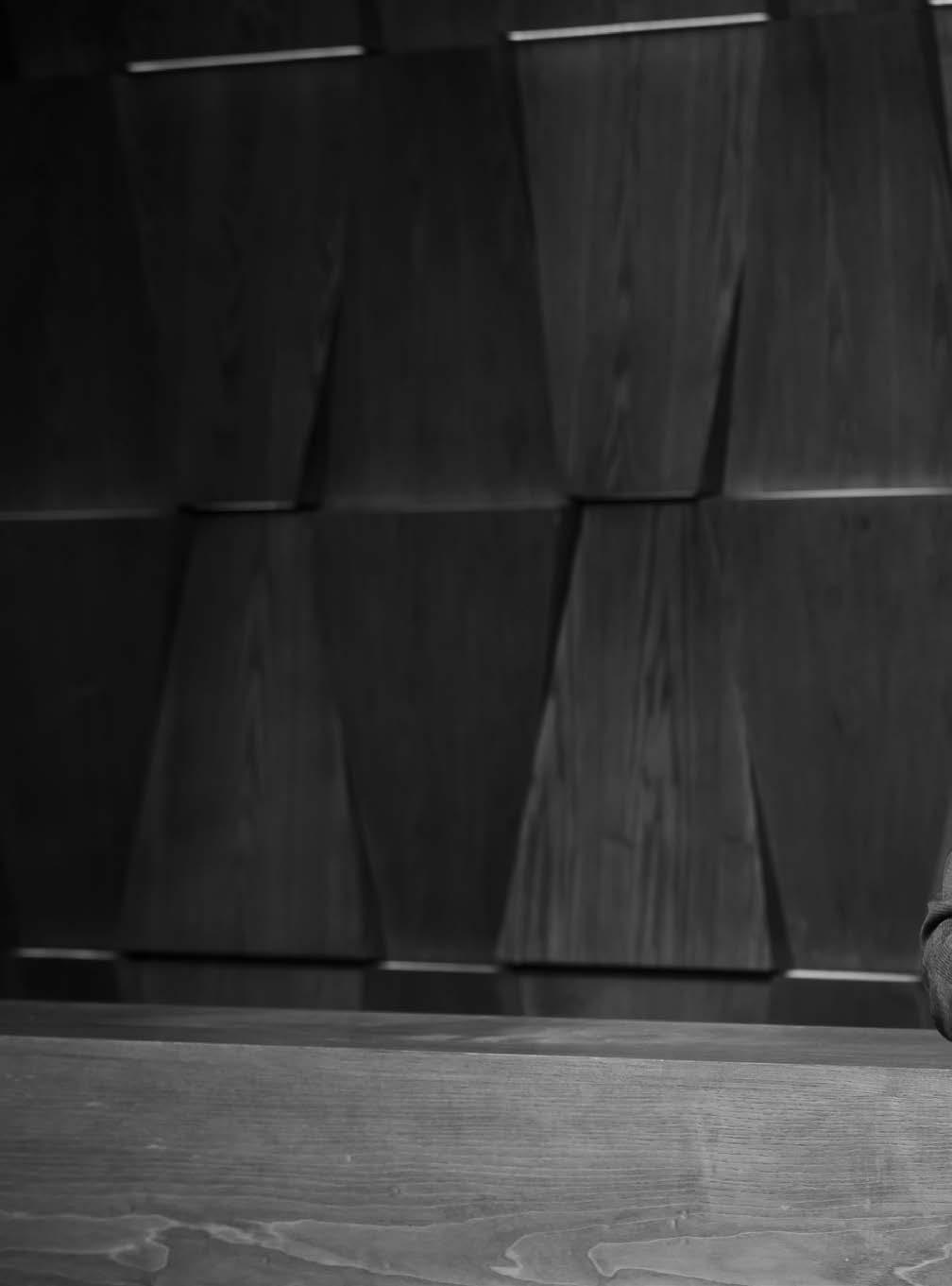
HOW
e& GROUP CEO, BET THE FUTURE ON REINVENTION – AND TURNED A REGIONAL TELCO INTO A $20B GLOBAL TECH PLAYER.
by AALIA MEHREEN AHMED
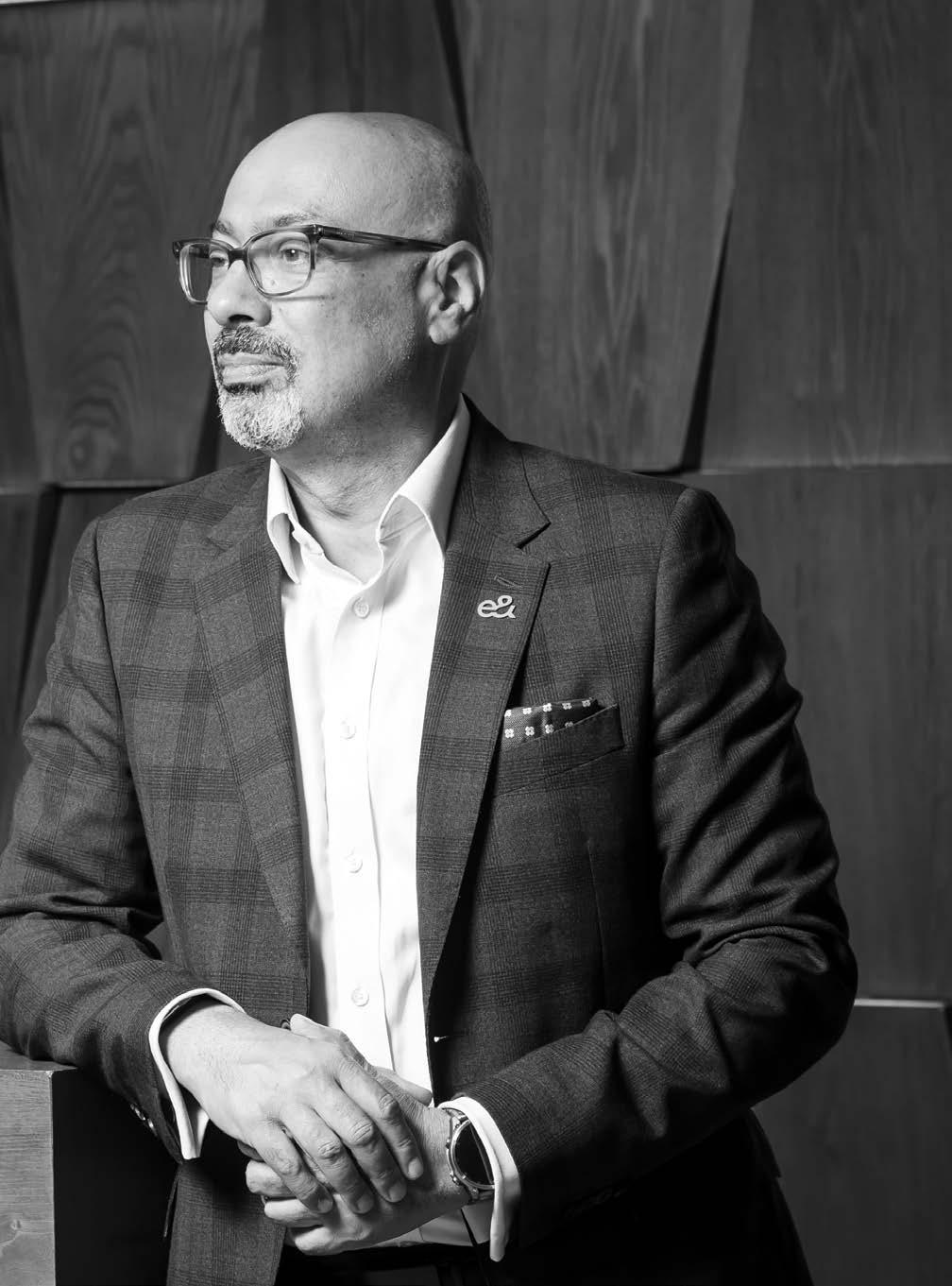
→ Hatem Dowidar is the Group CEO of e&, a position he has held since 2020. He initially joined the company in 2015 as Group COO and became CEOInternational in 2016.
Five years ago, Hatem Dowidar stood at a crossroad most CEOs only face in theory. The company he had just taken over – then still called Etisalat – was profitable, respected, and “dangerously comfortable.”
“The reality for telecom operators is very different today, its not just about providing a stable mobile connection,” he says. “We had become like utilities – necessary, profitable, predictable, reliable – and commoditized. To put it simply: we were successful, but we were the invisible infrastructure. The real value had shifted elsewhere: to the big tech players who built ecosystems on top of our network. We were still feeding the system, but someone else was eating the cake.”
For many leaders, being a utility with steady margins would have been enough. For Dowidar, this inertia was not an option. “In tech, complacency is riskier than failure. Reinvention wasn’t optional – it was survival,” he said. “So, we asked ourselves: how do we grow when the traditional playbook no longer works?”
The choice was clear: stay in the lane of minutes and megabytes, or a leap into uncharted territory. And in February 2022, it was the moment Dowidar decided to leap and chart a new playbook. “Either we rewired everything, or we’d end up a footnote.” During a speech delivered at this year’s Mobile World Congress


in Spain, Dowidar described the process of transforming the company as having to “risk everything by changing everything”. He wasn’t exaggerating.
Indeed, the leap came with a new brand identity and a complete transformation as the company rewired itself from being a regional telecom leader into a global tech group adopting a “platformization” strategy with five distinct business verticals spanning connectivity foundation with e& UAE; consumer digital services with e& life; driving digital transformation for governments and businesses with e& enterprise; telecom operations across 19 countries with e& international; and strategic investment with e& capital.
Proof in the numbers and actions
Such a massive shift was as much cultural as operational—a move that often comes with its own set of challenges. “Changing the name, the color, the identity was a signal, to our people, our partners and the world: this is who we are now,” Dowidar explains. “Yes, there was skepticism. Reinvention always comes with risk. And looking back now, with e& named the World’s Fastest Growing Brand in the Brand Finance Global 500 report this year, and our brand portfolio and investment value surpassing US$20 billion this year, we know it was worth it.”
Indeed, 3 years into the transformation, that momentous decision has paid off in more ways than one. In addition to the milestones Dowidar mentions, the Group now sits among the Top 10 telecom brands globally with an AAA brand rating, having achieved a Brand Strength Index score of 84.6. What transformed e& from a regional player into a global contender was a series of bold bets, powered by innovation and backed by landmark deals that continue to define the group’s journey.
Right at the beginning of the year, at the World Economic Forum 2025 in Davos, e& announced a partnership with IBM to roll out an end-to-end AI governance framework – the kind of compliance-first move that puts it ahead of looming regulations.
The partnership aims to strengthen e&’s AI governance framework, ensuring compliance, effective oversight, and ethical standards throughout its expanding AI ecosystem,
while simultaneously strengthening the company’s dedication to strong governance, risk control, and regulatory adherence in all AI applications.
Then, in July 2025, e& partnered with Amazon Web Services (AWS) and the UAE’s Cyber Security Council to launch the UAE Sovereign Launchpad, a platform designed to keep sensitive UAE data onshore while accelerating AI adoption to support the UAE's ambition to lead in digital infrastructure. It’s the kind of infrastructure that could decide which nations win the digital sovereignty race. e& is also working with the UAE
YES, THERE WAS SKEPTICISM. REINVENTION ALWAYS COMES WITH RISK. AND LOOKING BACK NOW, WITH e& NAMED THE WORLD’S FASTEST GROWING BRAND IN THE BRAND FINANCE GLOBAL 500 REPORT THIS YEAR, AND OUR BRAND PORTFOLIO AND INVESTMENT VALUE SURPASSING US$20 BILLION THIS YEAR, WE KNOW IT WAS WORTH IT.”
↑ e&, headquartered in the UAE, is a global technology group focusing on connectivity, digital services, fintech, enterprise solutions, and entertainment. It spans 38 countries across the Middle East, Asia, Africa, and parts of Europe.

Cybersecurity Technology Innovation Bureau, which will focus on developing homegrown cybersecurity solutions. The UAE Sovereign Launchpad with AWS, is expected to add an estimated US$181 billion cumulative value to the UAE’s digital economy by 2033.
At the heart of e&’s endeavors across cloud, AI, and cybersecurity, however, has been a decision that has enabled all of these initiatives to happen in the first place: a sovereign stack. For the uninitiated, a sovereign stack is simply a locally governed digital infrastructure that ensures data residency, compliance with national regulations, and control over AI and cloud services. “The sovereign stack is about trust, control, and long-term resilience,” Dowidar says. “As a group operating in multiple markets, many with specific data governance and localization requirements, having a sovereign digital foundation means we can build and scale services in a way that respects national priorities and protects digital sovereignty. It also gives us the flexibility to innovate and with an edge, closer to our customers, with full visibility and ownership of the infrastructure layer.”
Dowidar then adds that e&’s efforts to directly benefit businesses in the UAE have two critical enablers in this regard: the first of these is the already mentioned sovereign technology stack; the second is its AI-NET.
The next-generation network backbone tuned for edge AI, provides UAE businesses with the speed, capacity, and security they need to run AI at its full potential, whether
AS A
SOVEREIGNTY.”
that’s making faster decisions, running smarter operations, or creating more valuable customer experiences.
For enterprise customers, this means faster, more reliable service with fewer disruptions, better call quality, and more personalized digital experiences.
Just in the last few months, e& capital has made significant moves, backing startups from fintechs like Fuze, Qlub, and Derq, to real estate platform Nawy, and AI scaleups like AppliedAI. e& life’s work with MOHRE is a great example of innovation with real impact, launching the UAE’s first salary solution for domestic helpers that brings unbanked communities into the financial system.
On the international front, a new wholesale hub in Miami is putting e& in striking distance of U.S. and Latin American markets. In Europe, e& acquired
Serbia Broadband through its partnership with PPF Telecom Group. In Africa and Asia, it rolled out nationwide 5G in Egypt and launched the country’s first fully digital remittance service, expanded fiber in Morocco, and bolstered Pakistan’s backbone with the Africa-1 Submarine Cable.
But the list of achievements e& has clinched, especially over the past 12 months alone, doesn’t end here– in fact, it could easily become something of a full-fledged feature of its own if I were to pen only those events down.
Instead, here’s the Group CEO himself highlighting some of the unmissable bits. “Results-wise, so far, we’ve had our most historic year on record, with our financial performance being driven by a series of bold, future-focused moves,” Dowidar reveals. “We successfully divested our stake in Khazna, enhancing financial agility to support long-term growth. Of course, as mentioned, the UAE Sovereign Cloud, in partnership with AWS, is a major step in advancing sovereign AI infrastructure. But what’s great is that our leadership in responsible AI was further recognised with the ‘Tier S’ rating under the Dubai AI Seal, which is a distinction held by very few. We also deepened strategic partnerships, including with Qualcomm, to fast-track innovation across 5G and edge AI.”
Why platformization matters
“These weren’t isolated wins,” Dowidar insists. “They’re proof that we’re no longer just selling connectivity,” he explains. “Instead, we’re building platforms others can innovate on – entertainment, fintech, AI, cloud, you name it.” With Wio, Careem, and Starzplay, e& shifted from selling minutes to embedding itself into people’s daily lives and expanding into daily life touchpoints far beyond telecom.
Dowidar describes e&’s philosophy with a startup-like bluntness: “At some point, every leader faces a fork in the road. Do you stay in your lane, or do you reimagine the road entirely?”
So, instead of owning every touchpoint, e& began orchestrating ecosystems – from banking and mobility to streaming and shopping. Careem Everything App, Wio’s digital banking services, and Starzplay’s streaming platform became nodes in a bigger web – all tied back to e&.
And it’s working. The platformization model has also opened doors to sectors that once seemed
“
SUSTAINABILITY IS THE TEST OF OUR STRATEGY. THAT’S THE MINDSET I’VE TAKEN INTO e&’S 2030 STRATEGY ANYWAY. BECAUSE FOR US, GROWING WHILE DECARBONIZING IS THE ONLY WAY TO TRULY BE FUTURE-PROOF. TO BUILD AN OPERATING MODEL FOR THE DECADES AHEAD, WE NEED TO SUSTAIN SCALE AND DECARBONIZATION AT THE SAME TIME.”
unrelated. Careem Technologies' total gross transaction value (GTV) increased 117% year-overyear, with GTV per user rising 74%. Starzplay’s OTT platform has crossed 10 million installs and added 2.4 million new installs in Q2 of this year alone. Wio has significantly expanded its presence among both consumer and SME segments and was recognized as the Middle East’s Best Digital Bank by Euromoney.
“The lesson,” Dowidar says, “is you don’t need to own 100% to unlock 100% of the opportunity and reap 100% of the value.”
He emphasizes that there is a straightforward goal in executing all these shifts: customer ease and satisfaction. For consumers, the shift means fewer log-ins, more integration. “From entertainment and shopping to fintech and mobility — you can do more in one place, with more relevance and reward,” Dowidar says. For businesses, it’s intelligent connectivity that shortens decision cycles, personal-
izes experiences, and runs AI at full potential. Speaking of customer “ease,” that notion also happens to be the inspiration behind the name of e& smart stores. EASE is a complete reimagining of the retail experience, powered by AI and automation. Customers can walk in, activate their visit with biometrics or the e& app, and complete their journey without ever waiting in line. “Everything we do is driven by our customers,” Dowidar says.
For Dowidar, all these moves ladder up to e& Vision 2030 — a four-pillar strategy built around doubling down on core connectivity, diversifying the portfolio, digitalizing operations, and embedding sustainability.
“It’s the test of our strategy,” he declares. “That’s the mindset I’ve taken into e&’s 2030 Strategy anyway. Because for us, growing while decarbonizing is the only way to truly be future-proof. To build an operating model for the decades ahead, we need to sustain scale and decarbonization at the same time.”
e& has ambitious, science-based net-zero targets and is committed to cutting Scope 1 and 2 emissions by 43% and Scope 3 by 25% by 2030.
These goals demonstrate operational discipline, ecosystem-wide accountability, and long-term competitiveness. But e&’s approach to sustainability is deliberately expansive. It goes beyond green tech, energy efficiency, and circularity to encompass Emiratization, digital inclusion, and future skills development. “We don’t treat these as parallel initiatives; they’re interconnected levers in a single, integrated strategy,” Dowidar says.
The Road Ahead
Hatem Dowidar inherited a steady telecom. He aims to leave behind a restless tech group. The risks have been high, the bets bold, and the work continues. Yet he’s still pushing the accelerator as he prepares for the final stretch of 2025.
He revealed that e&’s pipeline is packed with plans for deeper technology bets, sovereign tech stacks for more markets, and scaling AI responsibly.
But 3 years into e&’s transformation journey, Dowidar emphasizes that “In the grand scheme, e& transformation isn’t about being a success story. It’s about being a catalyst.”
“Our future growth will depend not only on what we build ourselves,” he concludes, “but also on what we enable others to build through us.” And in a region eager to prove it can create global platforms, that may be the bigger mould e& is built to break.
→ Under Dowidar's leadership, e& became the fastest-growing tech brand in the Middle East and Africa and the most valuable brand portfolio in the region. It was named the World’s Fastest Growing Brand in the Brand Finance Global 500 report in 2025, and its brand portfolio and investment value surpassed US$20 billion in the same year.
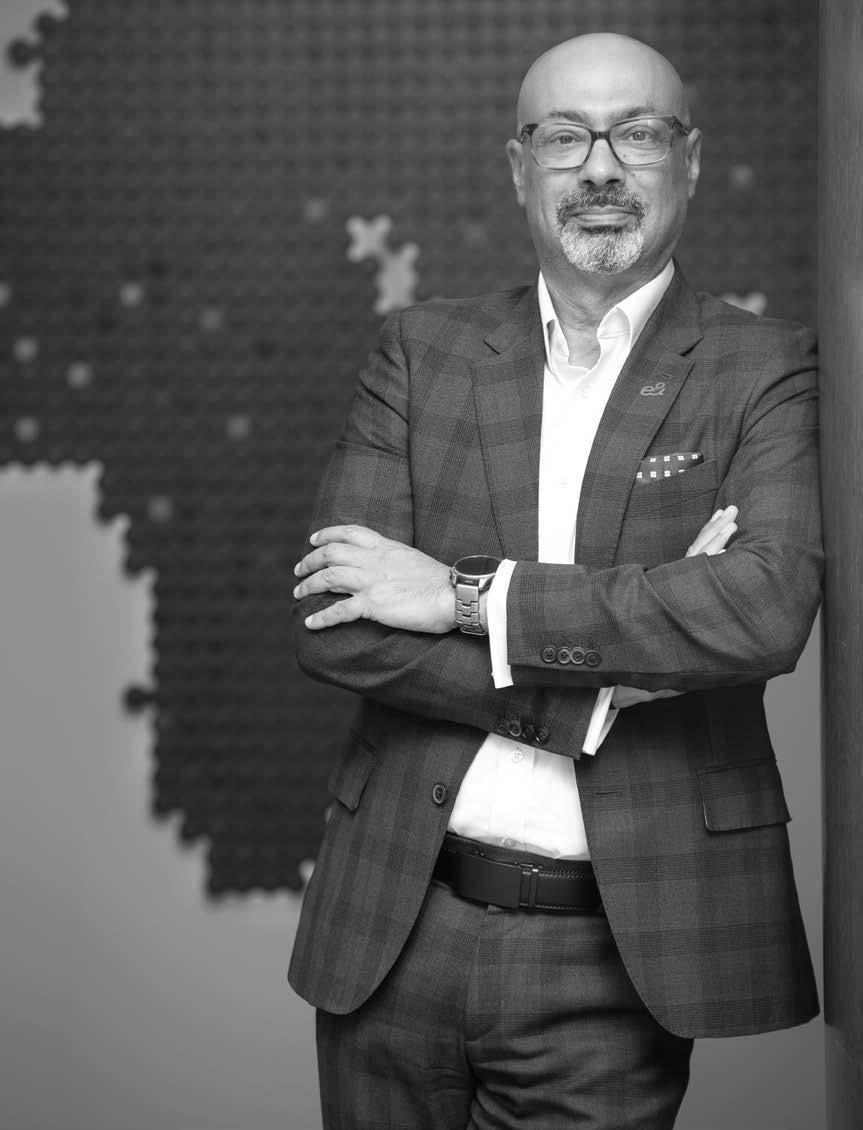


→ H.E. Najla Al Midfa is the Vice Chairperson of Sharjah Entrepreneurship Centre (Sheraa) and the Vice Chairperson and Managing Director of Emirates Growth Fund (EGF).
H.E. Najla Al Midfa
Vice Chairperson of Sharjah Entrepreneurship Centre (Sheraa)
Vice Chairperson and Managing Director of Emirates Growth Fund (EGF)
by TAMARA PUPIC
As Vice Chairperson of Sharjah Entrepreneurship Centre (Sheraa) and Vice Chairperson and Managing Director of Emirates Growth Fund (EGF), H.E. Najla Al Midfa straddles two worlds of entrepreneurship: one focused on planting seeds in fresh soil, the other on scaling forests already deeply rooted. Yet across both, her leadership ethos remains constant—cultivating an unshakeable culture, setting the bar high, and clearing obstacles so founders can move faster than they ever thought possible.

"Different stages, different contexts. But in both, my responsibility is the same: build keystone teams who connect unlikely allies, bridge silos, and keep the mission non-negotiable,” Al Midfa says. "Because at the end of the day, these aren’t just companies. They are the engines of a nation’s economic resilience.”
Her leadership at Sheraa has resulted in the Centre supporting over 450 startups and incubating more than 180, enabling them to generate US$372 million in revenue, raise US$297 million in capital, and create 2,690+ jobs. Al Midfa adds that 95% of incubated startups in the past three years remain operational, with 51% led by women, underscoring Sheraa's inclusive ecosystem. At the core is the Sharjah Entrepreneurship Festival (SEF), uniting 44,000+ attendees, awarding over US$200,000, and inspiring 93% to launch their own ventures. Reflecting on her role at Sheraa, Al Midfa explains the complexity behind building an entrepreneurial hub, "At Sheraa, the challenge is orchestration. We are architects of an entire ecosystem in Sharjah, cultivating founders, designing programs,
In some cases, the pendulum has swung too far. In the name of care, we have sometimes let accountability slide. And without accountability, growth – for both the business and the individual –stalls.” “
convening investors, and shaping a city’s entrepreneurial identity.” Keeping the momentum, Al Midfa adds, demands polymath teams. "One week they are culture builders, the next they are mentors, the next they are conveners of global networks,” she says. "The leadership task is to align those moving parts into a single, coherent rhythm without diluting standards.”
At the Emirates Growth Fund (EGF), the UAE’s flagship growth capital platform that was launched with AED1

billion by Emirates Development Bank to scale high-potential SMEs with revenues above AED10 million, her challenge shifts to precision. "We partner with SMEs that have already proven themselves,” Al Midfa explains. "The stakes are higher, the timelines sharper. Here, leadership is about pairing ambition with stewardship –unlocking exponential growth without destabilizing what is already strong, and opening the right doors at exactly the right time."
EGF invests through ticket sizes ranging from AED10 million to AED50 million, typically taking minority stakes of 20%–40%. Since launching, EGF has closed its first transaction with Tarmeem Healthcare Holding LTD, which employs 150+ people and serves 20,000 patients annually in Abu Dhabi. In just three months,
the fund has attracted interest from over 1,000 SMEs and is on track to close another deal this year. Over its lifecycle, EGF aims to deploy its AED 1 billion across more than 30 SMEs, generating an estimated AED3 billion contribution to the UAE’s GDP.
With these two prominent leadership roles, her true test of leadership lies in shifting gears—adapting mindset and decisionmaking from nurturing founders at the ideation stage to guiding those primed for rapid scale. Al Midfa describes the early-stage founders supported by Sheraa as explorers. "They move through uncharted territory with curiosity as their compass,” she says. "They will try, break, and rebuild – sometimes in the same week.” Her role is to fuel that momentum. "Push them to test, learn, and iterate with short cycles and clear hypotheses,” Al Midfa explains. "At this
Najla Al Midfa’s Advice for First-Time Leaders
}Lean into the conversations you are tempted to avoid.
}Leadership is not about waiting until you have perfect information – you never will. It is about acting with what you have, in the moment you have it.
}The instinct to sidestep discomfort is human. You will want to postpone feedback, soften truths, or maintain surface harmony. But the defining moments of leadership live on the other side of discomfort.
}When you face those moments with honesty, empathy, and respect, something powerful happens: trust deepens, culture sharpens, and you start to see yourself not just as a leader of tasks, but as a leader of people.
}And in our region, entrepreneurship is nation-building. Every honest conversation strengthens not just a company, but the foundations of an economy. That is where real leadership begins.
→

stage, I am in the trenches with them, a co-founder in spirit, pressure-testing assumptions and expanding their solution space beyond the obvious.”
When it comes to EGF, she sees scaling founders as navigators charting a very different course. "They have mapped their terrain, proven their model, and earned credibility. Now they need to grow without losing stability,” Al Midfa explains. "With them, the pace becomes more deliberate, the scrutiny sharper. These conversations are about focus – what to double down on, what to let go of, and where they themselves might be the bottleneck. Here, I am less disruptor, more strategic co-pilot, scanning the horizon for opportunities and risks they cannot see yet.”
In both worlds, Al Midfa highlights that connection is the constant. "One introduction can change the trajectory of a company; one conversation can change the trajectory of a leader,” she says. "And in a country where SMEs contribute more than half of non-oil GDP, those micro-shifts matter not just to founders, but to the nation’s economic trajectory.”
When asked about the toughest leadership decision she has faced, Al Midfa doesn’t point to budgets,
“
The leaders who will thrive in the next decade will master the balance of high care and high standards. They will create environments where people feel safe to experiment and fail, but also know that excellence is the baseline, not the aspiration.”
strategy, or market shifts. Instead, she emphasizes that the hardest choices are always about people—and the uncertainty that comes with guiding them through change. "A few years ago, I faced a choice that would reshape a leadership team I had built from the ground up,” she says. "On paper, the numbers were fine. But under the surface, the culture was fraying. Trust was eroding. I knew that if I did not act, the damage would compound. I still remember sitting across the table from someone
I respected, the weight of silence between us. Every instinct in me wanted to soften the truth, to postpone the inevitable. But leadership does not allow that luxury.”
Al Midfa adds that it was a decision that unfolded over weeks of listening, gathering perspectives, and carefully weighing the cost to individuals against the cost to the mission. Ultimately, her choice came down to protecting the mission and the culture she had promised to uphold. "In moments like that, you have to lead with clarity and compassion: clarity to make the call, compassion to execute it in a way that preserves dignity,” Al Midfa explains. "The uncertainty never disappears, but integrity becomes your anchor."
As the world moves deeper into an era of disruption, leaders are again being pushed to evolve. Al Midfa acknowledges that leadership has shifted from a relentless, top-down chase for growth to a more humancentric model, but she maintains that true balance has yet to be achieved. "In some cases, the pendulum has swung too far. In the name of care, we have sometimes let accountability slide. And without accountability, growth – for both the business and the individual – stalls,” she explains. "The leaders who will thrive in the next decade will master the balance of high care and high standards. They will create environments where people feel safe to experiment and fail, but also know that excellence is the baseline, not the aspiration."
Ultimately, she argues for a leadership style defined by “kindness with a spine.” Al Midfa concludes, "That is the future. And in our region, it is not just an organizational imperative but a national one: resilient economies require leaders who model both compassion and uncompromising standards, because that is what ultimately scales trust across societies and institutions."
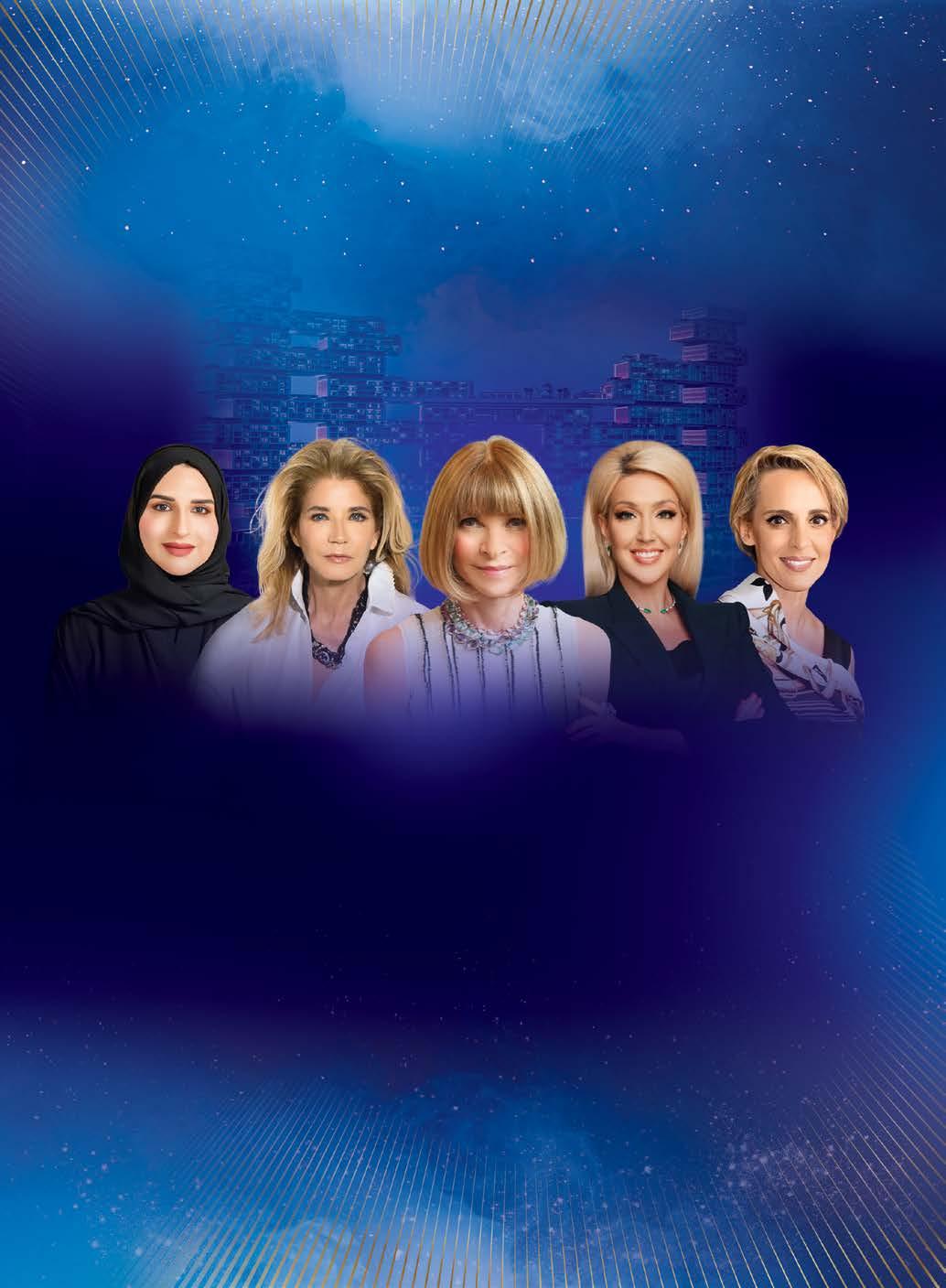
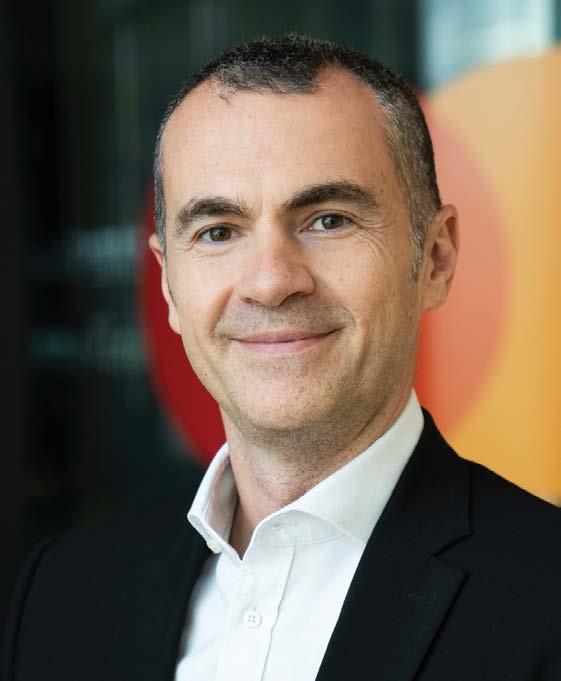
Mete Güney, Executive Vice President, Market Development, EEMEA, looks ahead to a new chapter of impact at Mastercard.
by TAMARA PUPIC
Marking two decades at global technology payments giant Mastercard is no small feat—especially when those years have been defined by continuous growth, impactful leadership, and a deep commitment to innovation.
After celebrating a 20-year milestone with the company, Mete Güney has stepped into an exciting new role: Executive Vice President, Market Development, EEMEA (Eastern Europe, Middle East, and Africa). "Since joining Mastercard in 2005 as Vice President of Sales, my journey has been extremely rewarding,” Güney recalls. "I was one of the youngest General Managers in Türkiye, taking charge of the Southeast Europe markets. In 2016, I moved to Dubai as the head of Mastercard Advisors, the company’s business consulting services arm and the world’s largest payments-focused consulting organization, for the Middle East and Africa (MEA) region."
Throughout his career, Güney has contributed to several milestone projects that have supported Mastercard’s growth and impact across the region, including the launch of Masterpass in Turkey, the digitalization of transit payments in several cities, the
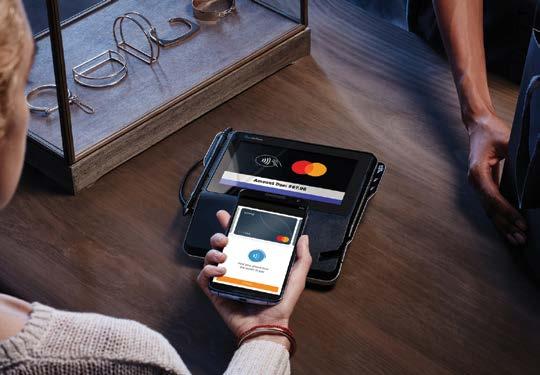
“MASTERCARD HAS BECOME MY SECOND FAMILY –WITH COLLEAGUES WHO’VE TURNED INTO FRIENDS, MENTORS, AND VALUABLE PARTNERS.”
space, including merchants, telcos, governments, fintechs, retailers, airlines, and many digital players across the region. Plus, he is leading the team that manages the company’s non-FI customer relationships while identifying and implementing new business opportunities with existing and new customers. With such an impactful career both behind and ahead of him, Güney credits one constant as the true driver of his success: the strength and support of his team. "Mastercard has become my second family – with colleagues who’ve turned into friends, mentors, and valuable partners,” he says.
account, mobile phone penetration is relatively high. And this is where the opportunity lies.”
Güney points out that the mobile money ecosystem plays a pivotal role in expanding access to essential financial services, particularly for underserved and unbanked segments, quoting GSMA studies that show the MENA region witnessing the world’s fastest growth in the number of active mobile money accounts at 28%. "At Mastercard, we connect consumers and businesses with trusted mobile payments across our global network, powered by our advanced technology,” he explains. "We have been actively involved in introducing innovative mobile payment solutions to new markets
establishment of our AI Center of Excellence in the UAE, a dedicated Cybersecurity hub in Saudi Arabia, and the launch of a training hub in Qatar to build local talent and capabilities.
Today, as Mastercard’s Executive Vice President, Market Development, EEMEA, Güney is responsible for developing and executing the company's strategy in 80+ markets and leading the profit and loss (P&L) across multiple business verticals in the non-FI
Güney will continue to navigate complex challenges with impactwith fintech innovations rapidly transforming the landscape of financial access and inclusion across the region, he remains committed to identifying the areas with the highest potential for growth while overcoming various challenges. "The main challenge we are facing in the region’s emerging markets is the high percentage of the unbanked and underbanked among individuals, as well as small businesses,” he explains. "While many people in these markets don’t have a bank
Mete Güney, Executive Vice President, Market Development, EEMEA, Advises
Entrepreneurs Navigating the TechFinance Landscape
} "Embrace the power of partnerships - but do so strategically. In today’s tech-finance landscape, no one can go it alone. Entrepreneurs should look for collaborators that complement their capabilitieswhether it’s gaining access to infrastructure, scaling distribution, or building trust with new customer segments. Some of the most successful ventures we’ve seen in this region are those that harnessed partnerships early on - whether with banks, telcos, or technology platforms - to accelerate their innovation and impact. Focus on solving real-world problems, but don’t be afraid to tap into established ecosystems to get there faster."

in line with our vision for a financially inclusive future.”
He predicts that the world’s rapid technology advances will lead to digital wallets and online banks becoming increasingly important. "These innovations will not only benefit individual consumers but also empower SMEs, many of whom have historically struggled to access financial services,” Güney explains. "By offering secure and user-friendly banking, fintech promotes financial inclusion, improving daily life and driving economic growth and financial fairness in communities worldwide.”
One example of this work is in Mastercard’s initiatives in Egypt. The company collaborated with the Central Bank of Egypt (CBE) and the Egyptian Banks Company (EBC) to introduce Apple Pay to the Egyptian market, marking a significant step forward in offering secure, contactless payment options to consumers. In addition, it partnered with Saudi Arabia-headquartered payments infrastructure provider PayTabs to launch a digital payment platform that empowers SMEs across Egypt to accept digital payments more efficiently, expanding their access to the digital economy and supporting broader economic growth.
Also, Mastercard has long recognized the vital role telecom operators play in advancing financial inclusion, and Güney insists that partnerships with telcos expand the reach of its solutions to underserved segments of
society and boost financial inclusion. "We are a technology partner of choice that supports telcos in diversifying their revenue and transitioning seamlessly to the finance space,” he says. "Our collaborations with leading telecom players have allowed us to offer a better payment experience to millions of consumers on mobile money and digital wallet platforms, where they’re already active and engaged.”
He adds, "We are enabling people to make online payments to a global network of merchants or even finance big-ticket purchases through pay-on-demand platforms. On the other hand, our advanced infrastructure delivers a first-class digital journey to consumers, driving greater adoption and usage for the benefit of the telcos. It’s a win-win situation.”
A prime example is Mastercard’s region wide strategic partnership with e& to drive an ambitious digital future for e& consumers in regional 16 markets. Through this collaboration, Mastercard has supported the evolution of e& money into a comprehensive superapp, designed to meet the full spectrum of customers’ financial needs and enhance access to secure, seamless digital payment solutions.
Once the conversation shifts to artificial intelligence, Güney notes that Mastercard hasn’t just embraced the technology—it has been actively invested in it for more than 15 years, positioning itself as both a pioneer and enabler in the evolving digital economy. "We are leading the way in utilizing AI, and are ramping up our investments in AI governance, technology, and talent,”
Mete Güney, Executive Vice President, Market Development, EEMEA, Advises Young Professionals
}It’s crucial to recognize that career progression is not linear: “instead, it's a dynamic path offering diverse and unique opportunities. At Mastercard, we actively encourage and witness significant lateral career mobility, demonstrating that professional growth is equally achievable by expanding skill sets horizontally across different business functions as it is by advancing vertically into more senior roles.
}Consistently deliver your best. "To truly unlock their full potential, I suggest to the young generation to prioritize continuous learning and skill development. Finally, strategically growing their professional network and proactively exploring new opportunities are paramount for long-term career fulfilment and impact."
AT MASTERCARD WE REMAIN DEDICATED TO PROVIDING THE TOOLS, KNOWLEDGE, AND NETWORKS THAT THE SMES NEED TO THRIVE. BY FOSTERING A MORE INCLUSIVE, DIGITAL-FIRST ECONOMY, WE ARE NOT JUST SUPPORTING SMES - WE ARE UNLOCKING POTENTIAL, DRIVING PROGRESS, AND BUILDING A FUTURE WHERE EVERY BUSINESS CAN SUCCEED.”
he says. "For example, AI allows us to protect the over 150 billion transactions that we switch on our network every year from cybercrime and fraud. In 2024, we initiated a collaboration with Dubai-headquartered digital commerce enabler Network International to make our AI-powered cybersecurity software Brighterion available to over 60,000 merchants across the region. Quick and easy to deploy, the technology monitors transactions for compliance, using machine learning tools that continuously update to keep up with cybercrimi-
nals’ increasingly sophisticated techniques."
Mastercard’s other activities in this space include the collaboration with Indian technology solution provider Redington in key EEMEA markets to protect all interactions across the payment ecosystem against cyberthreats, identity theft, fraud, money laundering, and disputes. More recently, Mastercard launched Account Intelligence Reissuance, an advanced fraud prevention service to efficiently manage the card reissuance process, in the EEMEA region. "The product leverages our

proprietary AI technology and network purview to assess the level of risk associated with a card and provide AI-driven actionable recommendations about which cards need to be monitored or replaced,” Güney explains. He adds, “in addition to its power to supercharge cybersecurity, AI plays a key role in analyzing the billions of data points that we have at our disposal today. This way, it drives better insights - from helping fintech companies decide on the best actions for their customers and proposing real-time personalized offers to generate more accurate predictions and improve measurements by removing bias. AI’s ability to identify patterns and inform decision-making can help more people and businesses get access to credit and solutions that enable them to thrive in the digital economy.”
As he looks to the future, Güney highlights AI’s transformative potential for small businesses. ”Companies
that don’t adopt AI risk being left behind," he says. "Evidently, SMEs in the region have been gradually embracing AI, usually by adopting one tool, testing its impact on one area of business and then scaling it across the organization. However, they are facing several barriers – from increasing costs to lack of technical expertise.” In this scenario, Mastercard is stepping in as a catalyst for change—partnering with fintech companies, governments, and banks to ensure that SMEs have access to cutting-edge digital payment solutions, real-time insights, and credit opportunities. "At Mastercard we remain dedicated to providing the tools, knowledge, and networks that the SMEs need to thrive. By fostering a more inclusive, digital-first economy, we are not just supporting SMEs - we are unlocking potential, driving progress, and building a future where every business can succeed,” Güney concludes.
by TAMARA PUPIC

year until I decided to jump into a kart and try it for myself. Amna inspired me to get into Motorsports and she’s the main reason I got into the sport initially.”
It was a shared family interest that has propelled Emirati sisters Amna and Hamda al Qubaisi onto the track, empowering them to redefine what it means to compete in a male-dominated sport. The two sisters credit their father, Khaled Al Qubaisi, the first Emirati racing driver to compete at the 24 Hours of Le Mans race in France, for their love of the sport. "What initially drew me to motorsport was the desire to bond with my father, who was my biggest inspiration as a racing driver himself,” Amna says. "From that connection, my passion for the sport naturally grew.” Hamda adds, "I watched my sister in karting for one
Amna Al Qubaisi made history as the first Emirati female racing driver to compete internationally, while her younger sister, Hamda Al Qubaisi, carved her own place in the record books as the first female in Italian Formula 4 history to claim a podium finish. As they reflect on their journeys, they share the defining moments that have shaped who they are — both on and off the track.
"The most defining moment for me has been seeing my country’s flag raised on the podium after a race win,” Amna says. "It’s an incredible honor—one that I constantly strive to experience again and again. That feeling has shaped me into someone with a tougher mindset, a stronger personality, and a deep commitment to always give 100%. It’s made me an all-or-nothing kind of person.”
For Hamda, getting into single seaters was a tough experience. "Just
jumping into a car and competing at high levels definitely made me stronger and also being able to make a name for myself in such a prestigious championship is definitely a big accomplishment,” she says. "That defining moment would be my podium in Misano, it helped me gain confidence in myself as a person on and off track and just made me a more hard working person.”
Speaking about the biggest obstacles they faced, Amna and Hamda say it was not only in competing against men, but in finding the funding and support to continue their racing careers. "There were countless moments where I had to work incredibly hard just to secure the right sponsors and backing,” she adds. "But those challenges taught me never to take anything for granted. I’ve learned to treat every race as if it could be my last, and that mindset pushes me to keep working hard—both on myself and in pursuit of my career.” For Hamda, it was about gaining selfconfidence on the race track. "I feel like being a female in the sport was

very challenging and gaining respect from other competitors was important,” she says.
Motorsports is as much mental as it is physical. How do the sisters prepare themselves—emotionally, physically, and strategically—before a big race? "I’m naturally a very confident person, so it doesn’t take much to get into the right mindset,” Amna says. "I go through my usual warmups and review the final bits of data before getting in the car. I always stay calm and composed—it helps me stay focused without letting any pressure affect my performance.” Hamda has honed a set of strategies to get herself into the ideal mindset before every race. "I do utilize my surroundings as much as possible, I like to
I always strive to carry myself with kindness and respect, while also showing my competitive spirit. It’s important to me to demonstrate that women in the UAE are strong, resilient, and capable of competing at the highest levels.” “

distract myself by talking to mechanics or my engineers before the race, I also like listening to music as it helps me be more motivated and charged and I would say always warming up before jumping into the car is a routine for me,” she says.
Both sisters raced in the F1 Academy, a series designed to develop young female drivers, and were part of the Red Bull Academy Program. In 2025, they joined Team Virage to compete in the Ligier European Series, marking their transition to endurance racing. On this journey, they draw strength and insight from each other. "One of the most valuable lessons I’ve learned from my sister— both as an athlete and as a person—is to take things step by step,” Amna says. "I tend to expect myself to get everything right all at once, but that mindset can sometimes lead to things spiraling out of control. Taking a more gradual approach has taught me to
be patient, make steady progress, and appreciate the small improvements along the way.” Hamda adds, "I think for me I was always very cautious and I overthink and being around Amna helped me push myself to jump out of my comfort zone and not care so much about what people say or think of me."
The sisters take great pride in representing the UAE on global racing circuits, but Amna feels that they also carry the responsibility of representing the female community. "I take that role seriously,” she says. "I always strive to carry myself with kindness and respect, while also showing my competitive spirit. It’s important to me to demonstrate that women in the UAE are strong, resilient, and capable of competing at the highest levels.” Hamda adds, "It’s definitely a feeling that is indescribable, to be able to hold my flag up high on a podium is definitely something very special to me and to give
Hamda
}"Believe in yourself relentlessly because confidence is everything. People may doubt you, but what truly matters is the strength of your own belief in your abilities."
}"Work twice as hard and stay twice as focused In industries where you’re the minority, you’ll have to prove yourself more often."
}"Stay true to who you are. Never feel like you have to change yourself to fit in."
}"Go for the impossible. Work hard for your dreams and grab the opportunity that comes your way."
back to my country in this way means a lot to me.”
When asked about their long-term goals, Amna hopes to win the 24 Hours of Le Mans and to see more women from the UAE competing on the global motorsport stage. Hamda echoes the same sentiment. "I definitely see myself breaking boundaries and creating opportunities for many women who ever want to get into a male dominated feel,” she says. "I am not just making a name for myself i’m also creating a path for those who want to follow."
→ Halima Jumani is the CEO of Kibsons, a UAE-based homegrown family-owned e-grocery platform that delivers fresh and ethically sourced groceries (such fruits, vegetables, poultry and bread) across the UAE.

Born in the heart of Dubai in 1980, Kibsons has today grown into a market leader in the fresh fruits, vegetables and produce industry. But behind the success of its pioneering efforts in affordable pricing, sustainability and quality has been a very simple notion that CEO Halima Jumani has empowered the family business’ core culture with: put people first.
by AALIA MEHREEN AHMED
here are endless stories on why different businesses decide, at a given point in time, to pivot to or incorporate the e-commerce/ online retail model. But perhaps few business leaders will be able to say what Halima Jumani, CEO of Kibsons, a UAE-based family-owned company that delivers fresh and ethically sourced groceries (including fruits, vegetables, poultry and bread) across the UAE, shares. “My background is in finance, so one day I was looking at the numbers of one of our divisions that was not making money and I was contemplating shutting it down,” she recalls. “In the process, however, I found out that there were 45 merchandisers on our payroll who would become redundant as a result of this decision. They came to me and said, ‘Ma’am, if you shut these contracts down, what will we do?’ I did not know at that time that they were also facing some visa problems due to political reasons [in their native countries]. But that conversation bothered me so much that I started this little hobby called e-commerce –back then we used to call it “home delivery” – thinking that if I make a spreadsheet of all our products and give it to close family and friends, they can eat well and save money, while our workers
could also have a job. I thought that maybe 50-100 orders would keep them going. I was not looking at money; I was just looking at breaking even and surviving for their sake. I had no clue that that idea would grow, and that we would now be doing 150,000 [online] orders a month! But think about that empathy for a moment…When I sit at the level I do, I have the privilege and power to drive that across my leadership team.”
The incident Jumani narrates happened circa 2016. Today, Kibsons’ e-commerce vertical alone has become possibly its most significant cash cow. But what happened then was not an isolated event but simply an extension of one of
beyond. Many years ago, in 2007, when I joined this company as a finance employee, I remember Jamal Hussain [Kibsons’ present Managing Director] would
↓IIn November 2024, Kibsons began phasing out its signature blue cardboard delivery boxes in favour of reusable crates, as part of a major sustainability push. This change is expected to save the equivalent of 2,100+ trees every month.

I REMEMBER JAMAL HUSSAIN [KIBSONS’ PRESENT MANAGING DIRECTOR] WOULD BE FOCUSED ON GIVING PROPER OR HIGHER RETURNS TO FARMERS EVEN IF WE’D SUFFERED A LOSS. BUT I JUST COULDN’T UNDERSTAND THAT AT THE TIME! I USED TO ASK HIM, ‘IF WE ARE HAVING LOSSES, WHY ARE YOU GIVING HIGHER RETURNS?’ AND HE WOULD SMILE AND SAY, ‘HALIMA, WE MIGHT SURVIVE THIS YEAR WITHOUT OUR PROFITS, BUT THEY WON’T.’”
the three pillars the brand has been built on since it launched in the UAE in the year 1980. “Kibsons has three strong core values, and the second of those is trust– we take relationships and trust very seriously, and honor them generation after generation,” Jumani says. “And when we look back now, that [in itself] has become the brand. Because it all started with a non-negotiable value that people should be able to trust us. It was also important that we developed that trust not just by honoring relationships, but by going above and
be focused on giving proper or higher returns to farmers even if we’d suffered a loss.
But I just couldn’t understand that at the time! I used to ask him, ‘If we are having losses, why are you giving higher returns?’ And he would smile and say, ‘Halima, we might survive this year without our profits, but they won’t.’ Because for farmers, their annual returns are what they count on, and relationships are long-term based. That view stuck with me. When I started our e-commerce vertical, upholding that became paramount. Also, with the
home delivery system it was all about making sure that we deliver quality, affordability, and reliability to our customers –day in, day out– every single delivery, right? So that too was about connecting back to the value of trust.”
Apart from building trust, Jumani shares that the other two pillars that make up the core of Kibsons’ operations are authentic passion and customer-centricity. “This is a generational business that understands the importance of quality, freshness, traveling around the world to deeply understand which varieties are better than others, and ultimately choosing varieties that are best enjoyed by the consumers in Dubai,” she continues. “So that passion
in what we do has converted to expertise over time– that’s pillar one. And for the third pillar, I actually wouldn’t even say customer-centric– I would take that one step forward and say we are very empathetic of humans as a family leadership. We have deep empathy and understanding for, first and foremost, our employees. Customer-centricity is of no use if you’re not employeecentric. For us, people are people. They are not numbers on a spreadsheet. Whether it is suppliers, employees or customers- we try to understand them and
deliver what is expected to the best of our ability as humans. And then to do it so often, and so much, that it owns that word, and becomes, ‘culture.’”
Perhaps the most tangible reflection of the company culture Jumani has strived to build is in the way the Kibsons’ headquarters has been designed, located within a 130,000 sq.ft. area in Dubai’s Ras Al Khor area that houses both offices as well as a cold storage warehouse. When I arrive there for my interview with Jumani, there are two things that immediately catch my attention: the first is that there are no physical demarcations within the office area- it is simply a big sunlit room where all the work desks are organised next to each other with no barricades in between. The second thing that piques my interest is how Jumani, whose fully glass-walled room is located
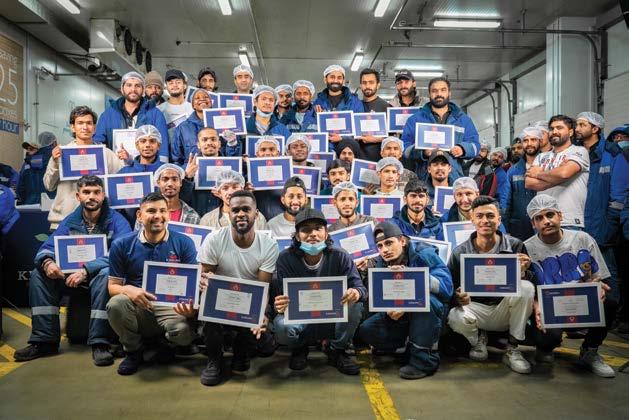
I AM SOMETIMES TOLD BY OTHER CEOS WHO VISIT MY OFFICE THAT MY DOORS SHOULD NOT BE SO WIDE OPEN… THEY SUGGEST THAT I SHOULD MOVE TO SOME OTHER PLACE WHERE THERE’S A RECEPTIONIST AND MY EMPLOYEES HAVE TO TAKE PERMISSION TO COME IN. BUT THEN I WOULD LOSE THAT DAY-TO-DAY CONNECTION WITH THE TEAM. HOW CAN I INFLUENCE MY PEOPLE IF I CAN’T CONNECT WITH THEM?”
right in the centre of the office space, walks in and out of her room to talk to her employees. The door to her cabin remains open for almost the entirety of my stay at the company (except during our interview).
“I have an open door policy,” Jumani tells me. “We are the only, I think, organization at our level which has such an incredibly flat structure. I am sometimes told by other CEOs who visit my office that this is not a good idea. That my doors should not be so wide open because, according to them, it takes from my energy. They suggest that I should move to some other place where there’s a receptionist and my employees have to take permission to come in. Now, that probably makes sense because then I can get my space to do things, right? But then I would lose that day-to-day connection with the team. How can I inspire, motivate, and influence them then? I see myself as being the “influencer” in this office. How can I influence my people if I can’t connect with them? That is what creates the culture, right?
But to say you have an open-door policy of connection is one thing; to do it is very difficult. So what I’ve ensured is that my senior leadership team carries that approach forward. That way we all have a united message that this is who we are, this is what we believe in, and this is what we do. That’s how I create the culture.”
Jumani’s endeavors in this regard led to Kibsons being ranked #16 in the GCC’s Best Workplaces in Retail (2025) by Great Place To Work®, the renowned global authority on workplace culture, employee experience and leadership behaviors.
But the accolade didn’t come Kibsons’ way simply because of how the organization’s interiors have been designed or for how its senior managers function. To ensure employee wellness remains sewn into the company’s fabric, Jumani’s people-centric approach has been extended to its hundreds of blue-collared employees as well. “We have recently, very discreetly, started offering organiza-
tional and life coaching to them,” Jumani reveals. “We are all humans at the end of the day. We have another life, another planet back home. So maybe there is something going on there that is affecting the work, but instead of giving our workers a black and white performance review and highlighting that there are some development needs, it is important to recognize that it may just be lack of focus because they’re going through a phase right now. And I’ve learned that the hard way because Jamal and I as owners have also had our phases. But we have the luxury to go through all these fancy mental coachings; they don’t. So what we’ve done is we’ve hired an organizational coach and very discreetly my new head of human resources (HR) arranges them, especially when I sense something is wrong. Not everyone is immediately open to it, of course, but there’s a contract that states that everything discussed is confidential. And over time, we’ve seen…honestly, forget about work, we’ve seen them change as human beings, and it just is the best feeling in the world. If you can
impact one human’s life mentally, what is the value of that?”
Indeed, while there is certainly no standard way of measuring the full impact of such initiatives at a visceral level, there have been multiple ways it has translated into positive business and societal impact. For starters, Kibsons’ 1,500+ strong workforce is today behind more than 200,000 tons of fresh produce distributed from its cold stores and production facilities, every day, to a network of more than 600 suppliers and customers. In April 2023, spurred by the positive feedback from customers and an increasing demand, Kibsons also expanded its grocery home delivery fleet with 80 new refrigerated vans from Thermo King, a leading transport temperature control solutions provider.
“What is important is that we are mindful of our cost control,” Jumani says. “We’ve achieved profitability through the years, especially last year. But the challenge for us really has been to remain profitable without increasing prices. We haven’t done price increments at all so far! Because we also know that if Kibsons increases the prices, everybody else will follow. So we are holding that fort for our customers because it’s really difficult; the grocery shopping bills are difficult. The way we look at it, we are also very grateful that we are in a position to positively impact the community of Dubai and the UAE by enabling them to eat better and healthier at an affordable price, and therefore the notion of health and wellness itself becomes widely accessible. Don’t forget, back
in the days, a packet of blueberries in supermarkets was, like, AED20-23; we brought it down to AED9. Differences like that make our produce all the more accessible and penetrate into the lifestyle of the layman. We also give them access to varieties that would typically otherwise get rejected down the distribution chain. Today, our customers can choose across a number of categories including vegan, organic, expensive, premium quality, and affordable quality. That access and choice has changed the game.”
In extending this accessibility and fair pricing to more avenues, Kibsons has also forged partnerships with UAE-based retail outlets M&S Foods and Sainsbury’s. But so far, the company has strayed away from collaborating with third-party delivery platforms in the country. Jumani notes that while this reluctance is not a definitive “no”, it is a decision that, once again, goes back to maintaining Kibsons’ core values. “It’s more about talking about the challenges that we face when we consider that option because for us, in the world of fresh produce, our cold chain management is extremely important. Not only that, but also we put our brand on the products that we deliver. So preserving that reputation of our brand is so important to us. But, mainly, there’s the affordability aspect– when we have more players, is it still going to be as affordable? I’m not sure. So I feel that there are so many different challenges to look at. But it’s not that a decision has been made that we will never work with them, nothing like that. We are still looking at ways on
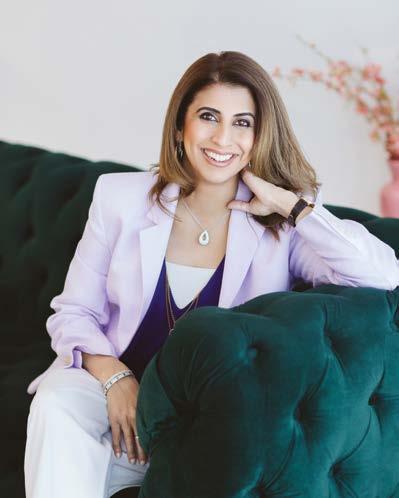
“
} We have recently, very discreetly, started offering organizational and life coaching. We are all humans at the end of the day. We have another life, another planet back home. Instead of giving our workers a black and white performance review and highlighting that there are some development needs, it is important to recognize that it may just be lack of focus because they’re going through a phase right now.”

how we can collaborate in a powerful way without compromising on what is important to us. So that conversation will continue.”
Now, in creating an equitable ecosystem, Jumani and her team have taken decisions that have inadvertently positively impacted the environment as well. In late 2024 it was announced that Kibsons had made the decision to shift away from its cardboard delivery boxes which had, for years, been visually associated with the brand and its marketing. The company transitioned towards a smarter, more sustainable solution: the reusable Kibsons box. Since then, in addition to cost reductions, it has also achieved a number of environmental milestones: approximately 875 tonnes of cardboard packaging were removed from circulation, a little over 14,000 trees were saved, and an estimated 177.6 metric tonnes of carbon dioxide (CO2) emissions were avoided.
“When we removed those
boxes –for a number of reasons but mainly because they were killing 2,100+ trees every month– we became environmentally sustainable, and it brought our costs down as well,” Jumani iterates. “Very easy to now talk about it as a story but, you know, back then, I was super scared. Because our boxes were the brand. It wasn’t an easy decision but we made it and we survived it. Similarly, in-house, we did our last-mile artificial intelligence (AI) digitization. So, for starters, we were able to make all our drivers’ routes more efficient and even more than that, we were able to track that efficiency for performance purposes and our fuel cost was reduced by 20%. So, for example, even though I lost 15 vehicles a few months ago due to some rain-related issues, I haven’t had to replace them yet and we’re still operationally fine. There’s also the fact that we now have a completely automated, AI-driven purchase order (PO) system, which means that if you’re a local supplier in Dubai, your
POs are system-generated. How does that help us? Our targets on food wastages were already 2%; now they’ve come down to 1% because the system is just so smart. So small things like that help us reduce our costs, increase our employee payouts and remain profitable.”
Maintaining this low-cost model ultimately helped
Kibsons survive the COVID-19 pandemic as well, with Jumani revealing that their unchanged prices during a time when many took a financial hit actually resulted in an increased demand. “Because of COVID-19, the inbound logistics were expensive, and I remember going and asking Jamal what we were to do with all these extra costs,” Jumani recalls. “And he said, ‘Halima, do not change the price on anything on our platform. Because if you do, then people will panic more.’ So we took the financial knock –no business is ready for three to four times the demand within a period of a few weeks– but we also lived up to the expectations that were placed on us. During those three months of lockdown, nobody in Kibsons took a single day off; we treated that as a moment of responsibility! I remember telling my team, ‘Look, all of us could have been anywhere else in the world, but why are we here? This place, this moment in time, this is our
} The way we look at it, we are also very grateful that we are in a position to positively impact the community of Dubai by enabling them to eat better and healthier at an affordable price, and therefore the notion of health and wellness itself becomes widely accessible.” “
destiny. We are meant to be here.’ And, you know, people rose to the occasion. We truly believed we were second in line to healthcare for an emergency service, because you need medical help and you need food. It was a tough period where we took financial hits, but we also went back to same-day delivery in six weeks. We expanded that much in a short span of time. That’s a lot of work, but it’s done well. I think that was a real testimony of who we were as a team, how our values were aligned, and how each department kind of ticked the box swiftly.”
Living up to its title of being a certified Great Place To Work, the Kibsons’ top management has ensured that its well-performing employees aren’t just met with a pat on the back for their work but rather receive opportunities to upskill and grow. “Two words, attitude and hard work– that’s all I hire for; the rest I can teach even if you don’t have a degree to show for it,” Jumani says. “Everybody here gets on-the-job training. So when our employees do well, I don’t just say, ‘Yeah, well done;’ we give them a reward and performance-based increments. In fact, all of my senior operations team have risen through the ranks from within our internal system. So my picker becomes a driver. My picker becomes a storekeeper. My picker becomes logistics or data entry personnel. They upgrade! My top-performing pickers get upgraded. From there on they can become an assistant inventory controller or become a store manager. How would you become an assistant store manager without any degree in education, tell me? It’s because intellect is not equated with degrees in my eyes. And when your employees have something to contribute to the
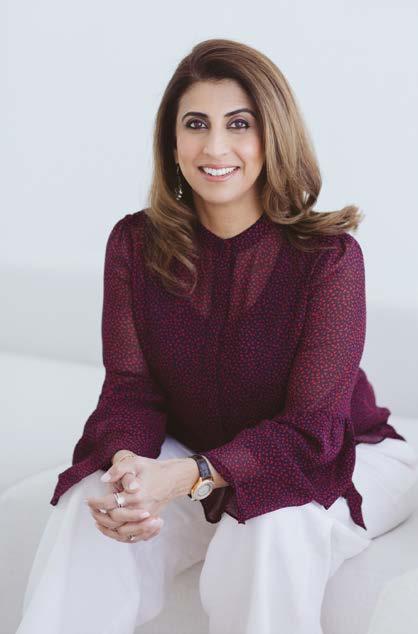
company that they are working for, they are aligned to the shared vision. This is not my vision; it is our vision.”
It is here that Jumani makes a heartwarming revelation. “Remember the 45 workers I talked about earlier? Well one of them is my entire distribution in-charge today. Without him, I don’t think we can do any deliveries. You’ve got to meet him. Doesn’t talk, didn’t really go to school, but he is the smartest brain in the compound. I have so much respect for him! So my motivation has always been people. I, as a human being, enjoy being around them, and reminding them that the fact that they did not get an opportunity to go through education does not mean they don’t have intelligence; it does not mean they don’t add value.”
Much like her decision to have an open-door policy at work, such sentiments too might be viewed as unconventional by some. But Jumani remains unperturbed by such external noise. “I’ve always been too busy and focused in my own life,” she says. “When raising me, my mom never said, ‘Don’t worry about what other people say.’ She just kept me so busy that I, by default, never worried about what other people said. It’s like what Shah Rukh Khan [the Indian cinema superstar] once said in an interview: “I don’t think good about you, I don’t think bad about you…So if you don’t think about anyone, neither good nor bad, then life goes on very easily.” I resonate with it. I don’t think about people or anything. I’m very focused. What that does is it gives you clarity. And if you don’t have clarity, you cannot go ahead with a strong sense of belief and authenticity. You can’t fake things for too long. Consistency cannot be achieved. And consistency cannot be achieved effortlessly unless it’s authentic. That decision has to be made internally as a leader.”
It is with that clarity and purpose that Jumani now aims to continue leading Kibsons. One potential goal that she says is “a matter of time” is an initial public offering (IPO). “Every business has their stages of growth and then there is a certain amount of growth that you cannot finance yourself,” she says. “The question always is how do you borrow that money or how do you raise that fund? But even more important than that, to me, is how those funds are going to be used. Because often what happens is business owners make very ambitious plans, they raise the capital, the funds come in and they don’t know what to do. I’m just very mindful of the fact that we need to have a financially feasible project and a timeline and clarity on where these funds will go. So that is something that we are actively working on.”
An IPO could mean a “Kibsons 2.0”, declares Jumani. But even while working towards that target, and striving to maintain and grow the company culture she has so carefully fostered, the CEO has embarked on a transformative journey of her own. “When God gives you privileges or the universe bestows you with privileges, whether that’s your mind, your talents, or your position of power, how do you do your best to positively impact others and choose to be more kind than more right- that is something I constantly keep thinking of,” Jumani says. “I’ve always been the person who had to be right and fair. But fairness is also kindness. And maybe because now my position in life allows me to do that more, I’m slowly working to evolve to be just that: more kind!”

by TAMARA PUPIC
OUR UNIQUE VALUE PROPOSITION LIES IN OUR ABILITY TO DELIVER SPEED, TRANSPARENCY, AND AN AWARD-WINNING USER EXPERIENCE, ALL WHILE PRODUCING TANGIBLE BUSINESS OUTCOMES—HELPING BUSINESSES SECURE LIQUIDITY FASTER, WITH LESS FRICTION, AND MORE PREDICTABILITY THAN TRADITIONAL APPROACHES."
For Karim Dakki, co-founder and CEO of Klaim, the surest path to growth starts with focus—zeroing in on one well-defined challenge, perfecting the solution, and only then branching out. It’s the formula that’s enabled him
“
a provider’s ability to operate, grow, and maintain financial stability.
"We started with a laser focus on healthcare, offering a unique solution— payment acceleration for medical claims,” Dakki says.
"For a while, this positioned us as a niche fintech player,
database exceeding 150 million claims, Klaim is able to develop robust predictive models. Its platform allows clients to convert submitted claims into cash in as little as 24 hours, reducing the uncertainty of long payment cycles and helping ensure consistent payroll and uninterrupted operations.
"As we grew, it became clear that the same liquidity challenges existed in other
sectors,” Dakki says. "That insight has shaped our roadmap toward expanding into selected verticals where we can replicate our model and deliver the same value.”
While Klaim’s roots lie in speeding up healthcare provider payments through its AI-driven claims platform, it has managed to broaden its focus to support SMEs and more sectors through early payment solutions for invoices,
Karim Dakki on the Dos and Don’ts of Launching a Business in the UAE
regulators early and apply for the right licenses before you scale."
WE’LL BE MAKING A MAJOR ANNOUNCEMENT SOON ABOUT THESE EXCITING EXPANSIONS.”
to create a robust product, demonstrate its market fit, and successfully move into new sectors.
Klaim enables healthcare providers and businesses to accelerate payments that would otherwise take between 60 and 180 days to be received. In the healthcare sector, such delays can have a significant impact on
but that focus also allowed us to build deep expertise, a strong brand, and one of the best LTV-to-CAC ratios."
The company currently serves more than 230 providers across the UAE, Saudi Arabia, and Oman, and has processed over US$400 million in payments to date. With a
Do's
}Leverage the businessfriendly environment
"The UAE offers clear legal frameworks, modern infrastructure, and supportive free zones that make it easier to set up and operate.”
}Build strong local relationships
"Networking is critical here; personal trust and reputation carry a lot of weight in business decisions.”
}Adapt to cultural nuances
"Understanding how business is conducted in the region—both in formal settings and over informal conversations—helps immensely.”
}Comply early with licensing and regulation
"In fintech especially, engage
}Use the UAE as a launchpad
"The country is a natural base for regional expansion, with access to MENA, Africa, and South Asia."
Don’ts
}Don’t underestimate timelines
"Regulatory approvals and large-enterprise partnerships can take longer than you expect.”
}Don’t treat the region as a single market
"The UAE, KSA, and other GCC countries have different rules, consumer behaviors, and payment ecosystems.”
}Don’t focus only on expat markets
"Nationals are a key part of the customer base and decision-making structure in many sectors."

addressing challenges like long payment terms and slow receivables for businesses with large invoices. It also enables its customers to access payments often within 24 hours after rendering services, avoiding delays and complexities typical in many sectors.
"Recent milestones include the launch of Klaim Health, the significant expansion of our fintech offering in healthcare beyond claims,” Dakki adds. "While healthcare remains our core, we’re in the final stages of launching our payment acceleration model to other high-potential verticals. We’ll be making a major announcement soon about
these exciting expansions.”
In line with this, Dakki advocates a focused approach—perfect one solution before broadening horizons. “However, maintain optionality - Plan A, B, C - as we never know what will work initially,” he adds. "Be determined but not stubborn, and maintain focus before diversification—both in products and geographies.”
Dakki has chanelled his wealth of experience as both an entrepreneur and executive, into the strategic decisions that have shaped Klaim’s growth. "I began my career as a consultant with Accenture in Paris, where I learned how to manage and deliver large-scale, complex IT
“WE’VE BUILT A DEDICATED INVESTMENT TEAM WITH INVESTMENT-BANKING AND PRIVATE-EQUITY DEPTH, BECAUSE IN HEALTHCARE PAYMENT ACCELERATION, SUSTAINABLE GROWTH DEPENDS ON RAISING RESOURCES EFFICIENTLY AND MANAGING THEM WITH PRECISION.
Klaim CEO Karim Dakki on Tackling the Toughest Hurdles in Building a Fintech for MENA’s Claims Market
} Fragmented healthcare and insurance ecosystems
"Each country operates with different regulations, claim formats, and processing workflows, making it hard to create one standardized solution."
}Complex stakeholder alignment
"Hospitals, clinics, insurers, TPAs, and regulators all have competing priorities and varying levels of tech readiness."
}Regulatory compliance variance
"Different jurisdictions impose different licensing, data privacy, and financial regulations, requiring a product to be both modular and adaptable."
}Data quality and interoperability
"Inconsistent coding standards, missing documentation, and lack of API-ready systems make automation challenging."
}Trust and adoption curve
"Convincing providers to trust a fintech with their claims and payment flows requires education, proof of security, and demonstration of tangible value."
}Liquidity as inventory
"Unlike pure SaaS, a claims-accelerating fintech must continuously secure and manage liquidity to match claims purchase demand."
}Scaling with risk control
"Balancing growth with prudent underwriting and fraud prevention is critical in markets with varied enforcement of payment obligations."
projects—an experience that taught me discipline, structured problemsolving, and the importance of execution in the technology field,” he says. "After completing my MBA, I made a complete shift into finance and investment, joining a private equity firm for 10 years. I was fortunate to work under a CEO who believed in me and who gave me the flexibility to design an investment blueprint and go out to source deals based on that strategy.”
Dakki recalls that one of the most significant ventures from that period was him co-founding of Irrawaddy Green Towers (IGT), which rapidly grew to become the largest independent telecommunications tower company in Myanmar. Established around 2013–2014, IGT secured a mandate from Telenor to deploy approximately 2,000 towers by 2015, and ultimately expanded its infrastructure to nearly 4,000 towers, serving all major operators in the country. The company was positioned for acquisition—in one of Myanmar’s largest-ever deals—until the outbreak of the 2021 military coup disrupted its progress. "That decade in private equity was invaluable—it trained me to think like an investor, a mindset that’s critical when running a startup,” Dakki says. "It also gave me the confidence to start a business of my own, confirming that entrepreneurship was not just a career choice, but my true calling.”
Today, Dakki leads a a team of over 60 professionals across product, engineering, data, risk, investment, operations, sales, and client success, with offices in Dubai, Riyadh, and Oman. Together, they built a product that differentiates itself by bringing real-time risk assessment, automated processing, and streamlined workflows together in a single, intuitive platform. "Our unique value proposition lies in our ability to deliver speed, transparency, and an award-winning user experience, all while producing tangible business outcomes—helping businesses secure liquidity faster, with less friction, and more predictability than traditional approaches,” Dakki says.
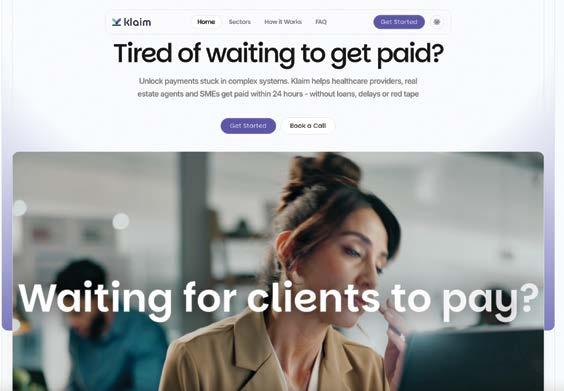
WE’RE COMMITTED TO SCALING GEOGRAPHICALLY: WITH KSA NOW FULLY OPERATIONAL, WE AIM TO STRENGTHEN OUR FOOTPRINT IN BOTH THE UAE AND SAUDI ARABIA, WHILE ALSO APPLYING FOR A VARIETY OF CENTRAL BANK LICENSES ACROSS THE REGION."
As a seasoned entrepreneur, he understood that fundraising demands full-time focus—prompting him to establish a dedicated investment team. Klaim has secured a total of US$26 million in funding—comprising US$10 million in Series A equity and an additional US$16 million in financing—to accelerate regional expansion across the GCC, particularly in Saudi Arabia, Oman, and the UAE.
"Fundraising is practically a full-time job for the CEO,” Dakki reiterates."We’ve built a dedicated investment team with investmentbanking and private-equity depth because, for a claims-accelerating fintech, ensuring financial capacity is core to operations. You have to raise it efficiently and deploy it safely. Since 2020, we’ve raised US$25 million in equity and secured flexible credit lines that can scale to US$100 million. My takeaways: traction is the most convincing pitch; focus beats breadth; and a “no” is feedback, not a verdict. If you keep delivering results and protect
your reputation, the capital follows—even though fundraising is often the hardest part of entrepreneurship.”
Looking ahead, Dakki outlines his vision and goals for Klaim’s next chapter. "First, we want to go deeper into the healthcare value chain— helping businesses beyond just claims, and expanding our solutions to address a broader range of operational and financial pain points,” he says. "Second, we see strong potential for horizontal expansion into carefully selected verticals where we can build a strong brand presence and create defensible market positions. Third, we’re committed to scaling geographically: with KSA now fully operational, we aim to strengthen our footprint in both the UAE and Saudi Arabia, while also applying for a variety of central bank licenses across the region. Beyond that, we’re actively exploring opportunities to expand outside the MENA region and replicate our model in new, highpotential markets."
UAE-based Oraseya Capital’s Hassan AlFarsi and Julien Plouzeau sit at the helm of one of the region’s most impact-driven venture capital firms. But even as they empower future-oriented startups, the duo dissect why the role of investors has transcended that of mere capital providers. by
AALIA MEHREEN AHMED
Here’s In early 2025, just a few months after completing one full year of operations in the region, UAE-based venture capital (VC) firm Oraseya Capital was revealed to have been the most active investor by number of deals in the UAE in 2024, in a study by data and analytics platform MAGNiTT. The same report showed that Oraseya Capital –the investment
arm of the Dubai Integrated Economic Zones Authority (DIEZ)– had been the second most active Series A investor in the broader MENA region that same year. But rather than investing in the business ideas alone, Oraseya Capital Partner and DIEZ Vice President Hassan AlFarsi emphasizes right from the beginning that the VC firm “invests in ambitious founders building regionally and globally scalable companies.”
FOUNDER-VC FIT MATTERS MORE THAN PEOPLE OFTEN REALIZE. IT’S ABOUT SHARED VALUES, MUTUAL RESPECT, AND BEING ALIGNED ON AMBITION, PACE, AND LONG-TERM VISION. THE STRONGEST FOUNDER–VC RELATIONSHIPS ARE BUILT ON TRUST AND TRANSPARENCY.” “
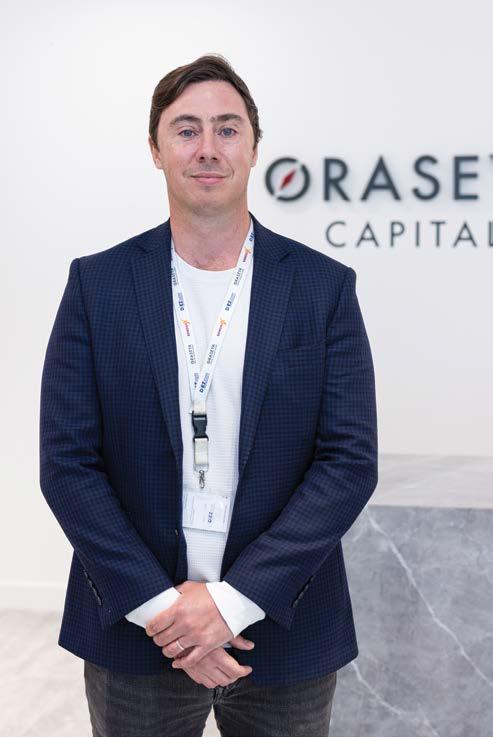
→ Julien Plouzeau is a Partner at Oraseya Capital, spearheading the investments across all stages and managing the fund’s portfolio.
“We currently have a growing portfolio across B2B software as a service (SaaS), fintech, artificial
intelligence (AI), edtech, e-commerce, and future-ofwork solutions,” AlFarsi reveals. “In 2024, our first
year of operations, we closed 24 investments. We are expecting a similar number of investments in 2025, closing some landmark investments including Ziina, Nymcard, Calo and a number of early-stage ones. We are sectoragnostic by design, because we believe innovation often emerges at the intersection of disciplines. That said, we tend to back companies with strong technology or platform foundations. At the same time, we also back startups with a nexus to the UAE — whether by market, operations, or impact — addressing meaningful pain points faced by individuals or businesses in the region. We invest from Pre-Seed to Series B; roughly 80% of our fund is allocated to Seed through Series B, with typical check sizes ranging from US$500,000 to $3 million. When it comes to earlier stages, we deploy capital through our in-house SANDBOX program, which enables us to run high-quality diligence at scale and support promising founders early in their journey through a structured and founder-centric environment.”
Creating such an environment is largely rooted in Oraseya Capital’s vehement “founder–VC fit” approach. “It matters more than people often realize,” says Julien Plouzeau, who is also a Partner at Oraseya Capital and has been a part of the UAE startup ecosystem since 2012. “It’s about shared values, mutual respect, and being aligned on ambition, pace, and long-term vision. The strongest founder–VC relationships are built on trust and transparency. It’s not about control or oversight — it’s about creating a space where the founder feels genuinely supported. Where hard conversations can happen, and where both sides are committed to helping the company succeed — not just to meeting short-term metrics. That’s why we’re highly intentional about who we back — and we hope founders are equally selective about the investors they bring on board. When the fit is right, the partner-
Hassan AlFarsi shares advice to founders working to grow their startups while navigating multiple funding rounds
}Don’t build for the next round — build for the long haul. “Early-stage founders often over-index on dilution, but the priority should be securing enough capital to build real momentum. As long as you’re within a reasonable dilution range, what matters most is putting your company in a position to reach meaningful milestones. Future investors can help clean up the cap table if needed — but they can’t rewind lost time or missed opportunities.”
}Develop a deep command of your metrics “Look at not just revenue, but how customers engage with your product, what keeps them coming back, and where the friction lies. Strong founders treat metrics as a compass, not a report card. Ultimately, it’s your ability to operate with focus, agility, and customer empathy that will shape your trajectory — far more than the perfect pitch deck or optimized ownership structure.”
}Above all, stay true to who you are “Your unique perspective, your team’s chemistry, and your lived experience with the problem you’re solving — that’s your real competitive edge. The most exceptional founders we’ve partnered with didn’t follow hype cycles; they followed their conviction. They built with depth, not noise — and that authenticity translated into products that truly mattered.”
ship becomes a real asset to the company — especially in the moments that matter most.”
Just like Plouzeau, AlFarsi’s endeavors at Oraseya Capital don’t mark his first rodeo in the world of startups and investments– with over 15 years of experience in finance, he’s also been actively involved in the UAE’s entrepreneurial ecosystem since 2014. With all the experience he’s thus amassed, AlFarsi has made one crucial observation about the UAE and the wider region’s investment space: funding stages in the MENA
region aren’t necessarily demarcated as clearly as they are in other geographies. “The lines between Pre-Seed, Seed, and Series A are often blurred, and founders are usually expected to show more tangible progress — especially when it comes to traction and metrics — than their peers in other geographies,” he notes. “Rather than rigidly adhering to stage labels, we assess each opportunity based on the startup’s level of maturity and readiness. At the Pre-Seed stage, we focus on founder clarity, technical strength, and whether there’s an early signal of real market need. For Seed, we look for initial validation — some paying users, a credible go-to-market plan, and early team development beyond the founders. Series-A is typically where companies need to demonstrate that growth is not just happening but can scale in a repeatable and capital-efficient way. By Series B, it becomes a question of operational discipline, healthy unit economics, and a convincing case for market leadership, ideally beyond just the local geography.”
But as Plouzeau notes, much of this intertwining of growth stages and investment-readiness has to do with the impressive pace at which MENA founders have upskilled and matured. “Founders’ mindsets have certainly evolved significantly over the past few years,” Plouzeau says. “Today’s founders are far more ambitious and global-first, designing products and business models with regional or international scalability in mind from day one — not just local market fit. They’re also more data-driven and capital-efficient. Growth at all costs has been replaced by a sharper focus on unit economics, sustainable expansion, and clear paths to profitability.”
This trajectory isn’t one that is evident solely through Plouzeau or AlFarsi’s personal observations, of course– the statistics that prove the MENA propelling into entrepre-
neurial success are endless. For starters, the UAE was ranked world’s #1 global destination for entrepreneurship for the fourth year running in the Global Entrepreneurship Monitor 2024–2025 report, outperforming 11 out of 13 key high-income country indicators, including access to finance, supportive policies, infrastructure, and school-to-work integration. In the Global Startup Ecosystem Index 2025 by StartupBlink, Saudi Arabia ranked second in the region, with a mammoth ecosystem growth of 236.8%,
“
→ Hassan

Venture capital has a vital role to play in accelerating the transformation of our region’s economy — not just by funding startups, but by bridging critical gaps that exist between ideas, talent, technology, and the market.”
becoming the only country globally to exceed 200% growth among the top 100 ecosystems in the report.
Quietly keeping up with, what can only be described as, this giddying pace of growth have been the investors in the region. “On our side as VCs, we’ve adapted accordingly,”
Plouzeau reveals. “We now place greater weight on fundamentals — resilient business models, thoughtful go-to-market strategies, and disciplined financial planning — rather than purely top-line growth. Another key shift is the rapid integration of AI tools by founders. Whether it’s speeding up
product development, automating repetitive tasks, or supercharging go-to-market (GTM) execution with lean teams, AI is enabling early-stage startups to do more with less — and at a faster pace than ever before.”
Indeed, the AI-driven growth being witnessed across the region, and the world, is one that has marked uncharted territories for both founders and investors alike. “It is undeniably the most transformative technology of our time — and as investors, we’re only beginning to tap into its potential,” Plouzeau notes. “On the upside, AI is becoming the engine of future progress, comparable to the early days of the Internet, progressively becoming a foundational layer of business operations. We see clear signals
of how central AI is becoming across functions — from strategy and product to customer service and operations. We're also seeing how AI is dramatically accelerating software development. Developers today are harnessing AI tools to prototype, build, and ship products at unprecedented speed — cutting down both cost and time-tomarket. What once took a team of engineers can now be achieved by a single founder equipped with the right tools. It’s the rise of the “10x developer” effect, where one person, amplified by AI, can operate at the velocity and output of an entire team. This shift is also powering a new wave of agile founders who are “vibe coding” their way to market — rapidly experimenting, building, and iterating using wrappers,
ONE — NOT JUST LOCAL MARKET FIT. THEY’RE ALSO MORE DATA-DRIVEN AND CAPITAL-EFFICIENT.”
agents, and open models. With AI as their co-pilot, they're able to test ideas and launch products at a pace that was unthinkable just a few years ago.” But with such speed and accessibility come unique challenges, reiterates Plouzeau. “The pace of change creates volatility — what’s cutting-edge today might be outdated tomorrow, making it harder to bet on the “winners” and
to assess long-term defensibility,” he says. “Lower barriers to entry mean more noise and more competition, which makes identifying true moats a real challenge in the AI space. There are also serious concerns around data security and regulatory clarity. As AI systems become deeply embedded into workflows and rely on sensitive data, compliance becomes critical.”
thinkers, ecosystem builders, and long-term partners to the next generation of AI-first founders.”
Julien Plouzeau shares some common mistakes that startup founders make when fundraising and how can they be prevented
Failing to clearly articulate why you, why now. “It’s not just about the product — it’s about the founder’s unique perspective, their edge, and the urgency of the opportunity. Too often, pitches dive deep into features or long-term vision but miss the mark on communicating founder–market fit or why this specific moment creates a window for disruption.”
Overlooking the power of transparency.
“Building investor trust isn’t just about showing traction — it’s about showing clarity. A clean, well-structured data room and the willingness to speak openly about risks, challenges, and trade-offs go a long way. At Oraseya Capital, we gravitate toward founders who are candid, self-aware, and realistic about their competitive landscape. Confidence is important — but humility and honesty are often what seal the partnership.”
Timing matters — and not just market timing, but relationship timing. “Some of the most compelling rounds we’ve led were with founders who nurtured the relationship early, well before they were actively raising. They kept us in the loop, shared wins and setbacks, and built conviction over time. Fundraising isn’t just a transaction — it’s a long game built on trust, and the earlier that journey starts, the stronger it ends.”
As such, Plouzeau notes that at the intersection of technology-driven innovation, meaningful social impact and founder-VC fit lies an onus on the investors to not just keep up with the game but also lead it. “The acceleration of technological change means that innovation cycles will no longer unfold over decades — they’ll happen in a matter of years,” he says. “As a result, identifying truly transformative trends will require deeper conviction, faster learning, and a stronger ability to filter signals from noise. This will make venture investing both more challenging and more rewarding. AI is already reshaping how we work as investors. From conducting due diligence and market research to drafting memos and tracking performance, we're leveraging AI tools to work more efficiently and uncover insights faster. But beyond operational efficiency, AI is also redefining the type of companies we back — and how we assess their defensibility, team dynamics, and ethical implications. At the same time, the growing focus on sustainability and impact will continue to shift our priorities. As VCs, we’ll be expected to back companies that not only scale but also contribute meaningfully to the world around them. That means seeking out founders who are mission-driven, building businesses that are resilient, inclusive, and future-conscious. In short, the VC of tomorrow won’t just be a capital allocator — we’ll need to be system
AlFarsi too reflects Plouzeau’s sentiments. “Venture capital has a vital role to play in accelerating the transformation of our region’s economy — not just by funding startups, but by bridging critical gaps that exist between ideas, talent, technology, and the market,” AlFarsi says. “When we invest, we’re backing more than a business — we’re enabling solutions that address real pain points faced by individuals, businesses, and entire industries. Whether it’s improving access to healthcare, streamlining financial infrastructure, or helping SMEs digitize, these innovations unlock efficiency, opportunity, and impact at scale. In doing so, VC funding fuels job creation, strengthens infrastructure, and supports long-term economic resilience.”
As the team at Oraseya Capital roll up their sleeves to end yet another year on a strong note, AlFarsi concludes with a simple reminder that brings to the forefront the very reason VCs and investors exist in the first place.
“There’s a powerful flywheel effect: every successful startup story inspires others to dream bigger; capital breeds confidence,” he says. “When a founder receives investment, it’s not just about the funding — it’s a validation mechanism that signals market readiness, attracts talent, and opens the door to partnerships and expansion. As VCs, we also bring governance, discipline, and structure to early-stage companies — helping them scale with strong foundations and sustainable practices. The more we do this across the ecosystem, the more bold ideas will emerge — and the stronger our regional innovation economy becomes.”

UAE-based Humantra has the backing of global business icons Huda and Mona Kattan, has rapidly expanded into the UK, and is one of the biggest homegrown success tales to come out of the nation’s entrepreneurial ecosystem. But founder Charlie Wright has a simple vision driving his next moves: to build a business that is an extension of his core values.
by AALIA MEHREEN AHMED
I've always felt like I was destined to do more…but I didn't really know what that pursuit was going to be,” says Charlie Wright, founder of UAE-based wellness brand Humantra, very early on during his interview. As will be evident by the end of this feature, it is this instinctive feeling –that of being “destined for more”– that has in many ways framed Wright’s many entrepreneurial decisions. But since tone of voice can sometimes get mistranslated in print, I feel obliged to mention that the phrase is uttered without a trace of pomp or arrogance– in fact the very first time Wright brings it up is while describing a period of his life when he’d felt
quite disoriented, right after finishing law school in the UK. “At that point in time, I didn't really know what I wanted to do next,” he continues. “I wasn't the smartest kid at school or the most athletic, but I learnt from my parents very quickly that work ethic was where I could often show up where others couldn’t. So I really had the mindset that I would try loads of things, and eventually work out what I'm good at. But I didn't think I was going to be an entrepreneur. It wasn't like I was selling sweets at school or doing anything when I was at university. But I just felt like I was destined to do more, and I was definitely career oriented. So while I didn't think that I was
going to have my own business one day, I was determined to be the best at whatever I do.”
But a few decisions, a move from the UK to the UAE, and a steady corporate job later, at the age of 27, Wright was hit with an epiphany. “I remember thinking ‘I'm really good at something that I really don't like doing; imagine how good I could be at something I'm really passionate about!’ At the time, my career was super mapped out in the corporate world. It was a very clear path from my twenties until retirement– but for some reason that frightened the life out of me. I was three years away from being 30, and I was like this is
not going to be the right thing for me. So I handed my notice in. I didn't know what I was passionate about, but I needed to try and find out what that was.”
A few years since that moment, Wright is today the founder of Humantra, a premium daily electrolyte sachet mix formulated with natural ingredients and containing zero sugar. Each sachet contains six essential electrolytes that help the human body absorb and use water more effectively. Available in four different flavors in distinct colors (lychee, berry pomegranate, elderberry, and Himalayan lime), it comes with a promise of being gentle on the gut, vegan friendly, gluten-free, and devoid of any artificial coloring. Launched in 2022, the idea was incubated at HB Investments, the family office of UAE-based business icons Huda and Mona Kattan. Humantra’s head office (which is where this interview took place) is, in fact, nestled within HB Investments’ office space in Dubai’s Jumeirah Lake Towers area. Having established itself as the go-to hydration brand in the country —indicated best by its #1 spot in the supplements section on Amazon and Deliveroo in the UAE— Humantra marked a rigorous expansion into the UK market (which began in 2023 through a collaboration with British streetwear brand Represent) by launching across 1,200 Boots stores in August 2025. This expansion, which came on the back end of an investment from London-based venture capital (VC) fund JamJar Investments in May, is set to increase Humantra’s footprint in the UK market which, at the time of this interview, was already contributing to 55% of the brand’s annual revenue. The week before this interview took place, Wright had also just gotten married.
Humantra was really born out of this observation that the wellness industry, the supplement industry, was full of noise. With it therefore being really difficult to navigate, we asked ourselves if we could try and create a solution that people could, first and foremost, trust.” “
what it takes to build a brand or build a business that actually worked. And Hopi actually worked, but we just didn't hit the scale we wanted it to hit. But from that experience I taught myself how to do email marketing, meta ads, everything. It was just this complete boot camp on how to build an e-commerce business, and it started to build my confidence up again. Without those two failed experiences where I was setting fire to my own money all the time –which was really scary by the way, because I didn't pay myself for the best part of four or five years– I couldn’t have learnt so many skills. There were some really dark moments throughout those points of time. But I think the callous nature of my mind was built from those experiences, and it ultimately became of paramount importance to what I then went on to do at Humantra.”
Indeed, it was Wright’s determination to go ahead with a second business that landed him the opportunity to create Humantra– quite literally, when he was pitching Hopi Contact Lenses to HB Investments circa 2021. “I was sitting exactly where you are right now while doing that pitch,” he tells me. “Off the back of that conversation,
↓ Ideal for everyday use across all lifestyles,
is a premium daily electrolyte sachet mix designed to help customers feel better, sharper and more energised every day.
But in the time period between Wright’s plunge into entrepreneurship and the eventual fairytale-like journey he’s been on with Humantra, the now 35-year-old had a particularly disquieting phase. For starters, he’d built two startups, both of which didn’t come to fruition as he’d hoped. “The two ideas succeeded to various different degrees, I’d say but the first one…I wouldn't really call it a business per se, because I don't think it got to the viability stage of being one,” he says. “But I lost all my money doing that– and lost all my confidence too. But even then, there was something in me, again, that felt like I was destined, well, not for greatness because I don't want to say I'm great. But I was always hungry for more! There was something in me that knew it was going to work out somehow. Soon after, I started my second business which was a direct-to-consumer e-commerce brand called Hopi Contact Lenses. Doing that gave me all the lessons in
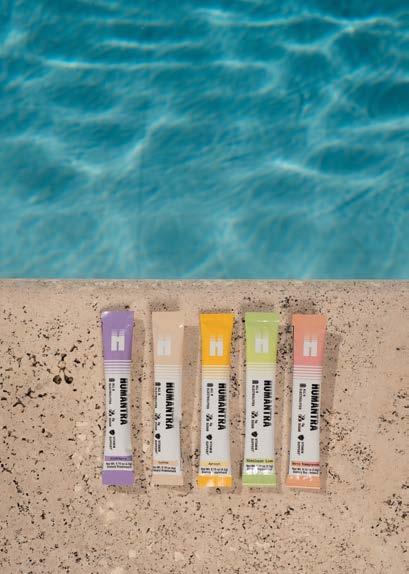
This business was really largely built on how I operate as a human being. We want to do cool stuff with cool people– that's been the mindset from day one! And ultimately, I want the people in this business to be better human beings.”
really abundantly clear to me that I wanted to be a master of one. And the most universal health need on the planet…the one thing that unified –whether you are at school, in your 70s, or a best in class athlete– was hydration. It's not a niche need. It's a universal need. That meant that we had a huge market ahead of us, which was really exciting. So we decided to be the best in class. Fast forward four years, and hydration still underpins everything we do as a brand. Because hydration clearly doesn't discriminate; supplements shouldn’t be reserved for the pro athletes and top sports champions. Everyone needs adequate optimal hydration. So we decided to go against every business book on the

HB decided that rather than invest in early-stage brands, why don't we create them? From there, HB Investments decided to incubate brands, of which there were two at the start– one of those was Humantra. So Humantra was really born out of this observation that the wellness industry, the supplement industry, was full of noise. With it therefore being really difficult to navigate, we asked ourselves if we could try and create a solution that people could, first and foremost, trust. The early idea was that we were going to have a variety of different products. But it became
planet, and rather than just go after a niche category, we were adamant to cater to a really big pool of people. And so far, touch wood, it's been going quite well.”
In thus creating a hydration supplement “for the human race,” Wright found his calling. But in driving forth that ambition, Wright emphasises there’s been a collective effort. “This business was really largely built on how I operate as a human being,” he says. “We want to do cool stuff with cool people– that's been the mindset from day one! And ultimately, I want the people in
this business to be better human beings. While you're under my stewardship, I'm always going to push people to do better, to be better. A big part of that also involves being respectful. These are the values I got taught at a young age, but often it can get lost in life. So I just hold myself to a high standard, and I expect the people I operate with –both in the team and externally– to hold themselves to such high standards as well.”
Having been acquainted with Wright’s leadership so far, it should perhaps not come as a surprise that the five tenets that make up Humantra’s operating philosophy are curiosity, optimism, ambition, compassion and humility; abbreviated as COACH. While much of what Wright has described so far has been the internal implementation of COACH, the most tangible public outcome of that notion has been Humantra’s campaigns in the holy month of Ramadan, which have now been running for two years in a row. For Ramadan 2024, the brand introduced a Rose-flavored electrolyte, in partnership with Deliveroo. In 2025, after launching its limited-edition apricot-flavored line, Humantra took its Ramadan initiative a notch higher by unveiling the UAE’s first-ever drinkable billboard at City Walk, Dubai. The unique activation allowed passersby to break their fast with Humantra’s electrolyte drink.
The most culturally acute moment in time for a hydration brand is Ramadan,” Wright says. “Millions if not billions of people go through one of the most difficult pursuits ever. And it is a journey that's largely rooted in hydration. For us doing the Ramadan-focused flavors and campaigns made total sense. It was us being true to who we were– both as people and as a brand. Cultural relevance isn't something we say we prioritize just to sound cool. It is genuinely how I operate as a person. I've lived in the UAE for 11 years, and I'm a very culturally respective person. When I
was in school, we were taught to call our masters ‘Sir/Ma'am.’ Even today, I call strangers ‘sir’ and ‘ma'am’ if they’re strangers to me. There is this idea of deep respect in me which is how my parents brought me up. Ultimately, I believe if we're not culturally relevant, people will not buy our products. Showing up in the moments that matter the most, and ensuring there is genuine authenticity behind them, is second nature to us. Look, as a brand we're the first to ever do it, and we've done it two years in a row. At some point I’m sure people will start catching on, and will see it as a commercial opportunity. But at Humantra we’re not just doing the Ramadan campaign to make loads of money. All my favorite brands are culturally relevant, and I think it is part and parcel of what makes a great brand. But the key feature in all of them has been that none of their cultural relevance is forced; it’s completely organic and true to their mission. That’s precisely what Humantra is doing too.”
Now, in mentioning how he looks up to his favorite brands (the one repeatedly brought up during the conversation being American clothing and shapewear company SKIMS), Wright alludes to something that has been a quiet constant in his leadership growth. “I'm inspired by people on a daily basis whether they’re in different businesses, fields or brands,” Wright says. “I wouldn't say there's one individual
that's kept me on the straight and narrow. I think I have an ability to
that I'm not hugely proficient in. Which I think is of great impor-
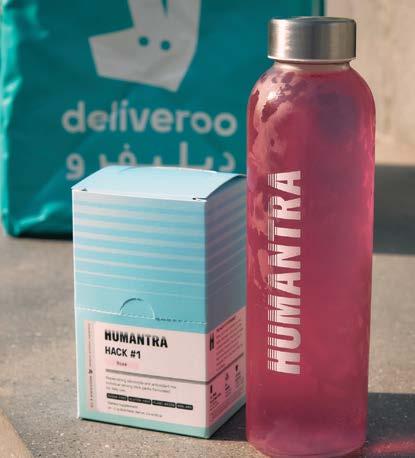
For us doing the Ramadan-focused flavors and campaigns made total sense. It was us being true to who we were– both as people and as a brand. Cultural relevance isn't something we say we prioritize just to sound cool. It is genuinely how I operate as a person.”
be really clear on where I want to get to, and then try and bring the right people around me that can help me navigate the toughness that ensues with life. You know, Huda and Mona [Kattan], for example, have been an incredible support to me as a founder. They have complemented me in areas
tance to a founder. Because for me –and I’ve said this to my team too– if I'm not proficient at something, I always go and find the best in class to help me. I think one of my best skills is also knowing what questions to ask and being quite forthright with how I ask them. So for me it's about
getting into the right rooms, and then asking the right questions. I've got so many amazing people around me.”
But to surround oneself with people that inspire and to use that to overcome uneventful business periods, Wright adds that it’s important to build two traits. The first of these is resilience, a word that is often used by entrepreneurs. But it is the second that he elaborates on. “You have to be accountable but I've also learned that accountability isn't feeling sorry for yourself; it is so much more,” he says. “I took complete ownership of my life- all the failings, all the wrongdoings. There is no one that I don't mind admitting to that I’m wrong. I'm wrong all the time. But I'll learn from mistakes. I believe one of the reasons why the board [at HB Investments] really liked me as a founder is because I’ll listen and take on feedback, and make decisions based on that. But, at the same time, I’m also really strongly rooted in independent thinking. I truly believe independent thinking and trusting my gut has been really important. I'm here today because of the decisions that I've made, whether they were right or wrong, and I've owned those decisions. So accountability and ownership boils down to not feeling sorry for yourself, but using the lessons learned to understand how we can better ourselves down the line. And I think that the underpinning nature to all of that has just been about, well, never giving up. Like, through all the different
↓ In July 2025, Humantra was introduced into more than 1,200 Boots locations across the United Kingdom, marking a significant step in its expansion plans

businesses and experiences, I have just never given up. It’s what’s kept me still going.”
If you’ve paid enough attention so far, you will remember that a big reason Wright swore to not back down in the face of detours and failure has been his innate gut feeling of being headed for something bigger. It is that thought that keeps fueling the fire in the founder’s belly. “I'd said in the earliest part of the interview that I was always destined for more– I firmly believe that this is what I was destined to do,” Wright declares. “I'm obsessed with this business. And I think it's down to product obsession, consumer obsession, and the like now. All of that has also been deeply woven into something that I actually need as a person as well. So it's not
his own optimism and ambition into his team. “I think we have this overarching vision of where we need to get to as a team,” he says. “Humantra has had loads of small pivots in how we position our brand and who we talk to as consumers. I think that's what the best businesses do. They learn and adapt, and they're not unwilling to be slightly different. Missions might change. Goals might change. We know that the world we live in right now will not be the same in four years, so it's very hard for us to gauge what the business will look like then. But I think we just have this
mindset that we want to be the best at this. For that to happen it comes down to having the best people around me. I have an amazing team, and what that means is that whatever happens, we will solve our way through it. I feel like for the first time, the best version of me is hyper concentrated at work in a way where I am all consumed, but it is not all consuming. There’s this sense of perspective now. I got married last week. My wife is incredible, and we want to start a family. So this is just…it’s going to be an important phase in my life.”
like I don't use our products; I use it everyday. I'm the biggest advocate myself- in the product; in electrolytes. I'm hugely passionate about this space, and I genuinely love what I do. I think that gives you staying power because when things get difficult, if you genuinely love what you do, you'll never give up. I also derive a lot of joy in this quest to not just build a great brand but a great organization that has longevity, and that people really love working at. So my obsession is rooted in genuine enjoyment in what I do, and how we can get better.”
As Wright now prepares for Humantra's next phase of growth, particularly following the brand’s launch in 1,200 Boots pharmacy stores across the UK, he hopes to continue injecting
“
I'M HERE TODAY BECAUSE OF THE DECISIONS THAT I'VE MADE, WHETHER THEY WERE RIGHT OR WRONG, AND I'VE OWNED THOSE DECISIONS. SO ACCOUNTABILITY AND OWNERSHIP BOILS DOWN TO NOT FEELING SORRY FOR YOURSELF, BUT USING THE LESSONS LEARNED TO UNDERSTAND HOW WE CAN BETTER OURSELVES DOWN THE LINE.”


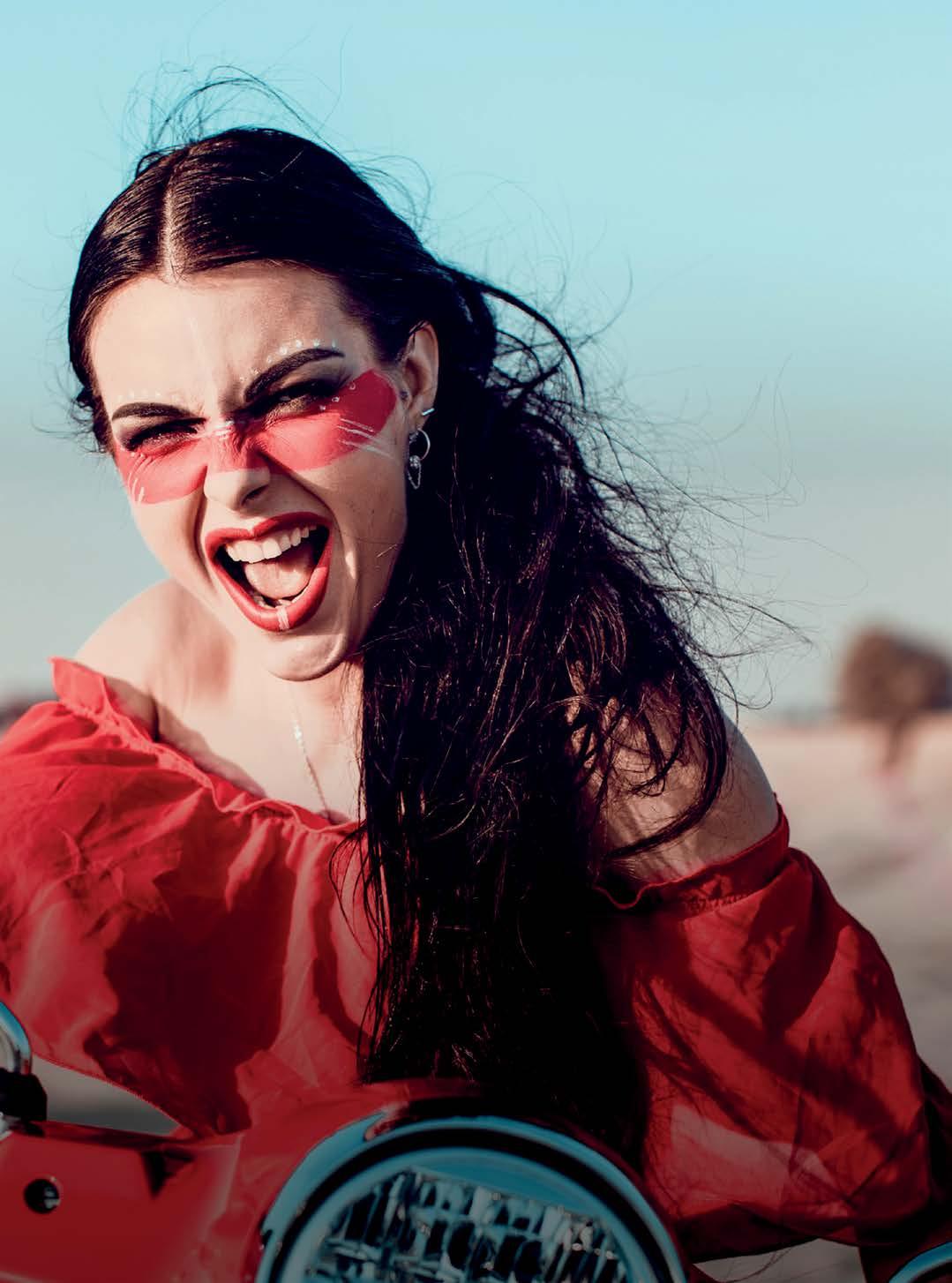

At the core of the UAE’s transformation into a thriving hub of achievement are Emirati women, whose personal journeys mirror the nation’s own extraordinary rise.
As the UAE honors five decades of Emirati women's achievements with the official theme of Emirati Women's Day 2025 “Hand in Hand, We Celebrate 50 Years”, Entrepreneur Middle East and AW Rostamani Group's Arabian Automobiles Company are putting the spotlight on six extraordinary Emirati women from different walks of life in the UAE.
The six women reflect on those who stood beside them, walking hand in hand and supporting their path to success in both business and life.
Under the banner of #DrivenByWomen, they offer a peek into the precepts and principles that have guided their personal journeys to success; plus, by finding common ground between them and some of the finest automobiles under the banner of AW Rostamani Group's Arabian Automobiles Company.
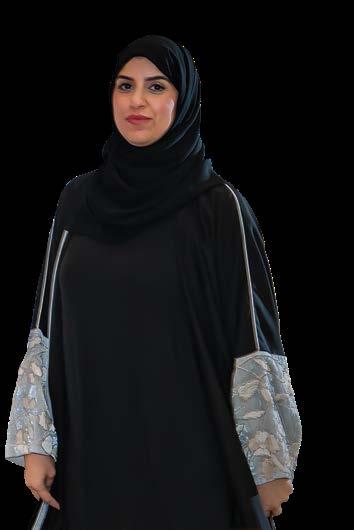





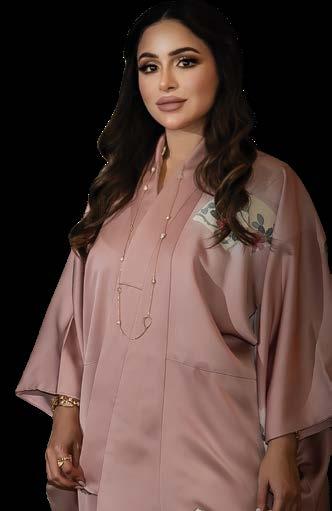

OFFICER, Pharmedic LLC
Mahra Al Hosani is a medical student and biotechnology researcher with a mission to digitize healthcare to enhance patient safety and accessibility. As the Founder of Pharmedic, an Emirati-led medication guidance platform which reduces drug interactions and medication errors through integrating machine learning (ML) technologies, Al Hosani strives to advance precision medicine by translating research into clinical practice. In leading Pharmedic, the young entrepreneur says she has been able to witness, firsthand, what it takes to drive purpose-led innovation. “This means going beyond surface-level interventions and committing to the hard work of identifying gaps across our clinical, technological, and genomic landscapes,” she adds. “Only by addressing these gaps, whether in early diagnosis, medication response, or access to personalized care, can we develop solutions that are locally relevant, scientifically sound, and globally competitive. In my own pursuit to achieve this, I am on a mission to ensure preemptive genetic testing stands as a powerful tool to deliver precision medicine that truly serves every patient, every family, and every generation.”
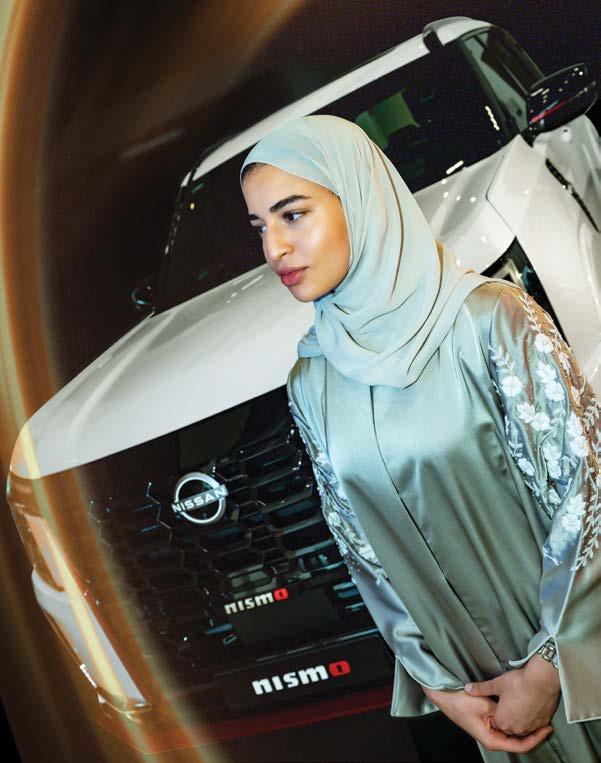
THIS NATION HAS BEEN BUILT BY THE STRENGTH OF BOTH EMIRATI WOMEN AND MEN, TOGETHER, WE UNITE IN PRECISION, PURPOSE, AND EXCELLENCE. THIS YEAR MARKS 50 YEARS SINCE THE FORMATION OF THE GENERAL WOMEN’S UNION, AND WE REFLECT ON HOW FAR WE’VE COME SINCE THE BEIJING DECLARATION. OUR DETERMINATION CONTINUES TO PROPEL MEDICINE, TRANSLATIONAL RESEARCH, AND INNOVATION.”
MAHRA HAITHAM AL HOSANI IS PICTURED HERE WITH THE THE ALL-NEW NISSAN PATROL NISMO , WHICH HAS BEEN ENGINEERED TO THRILL. COMMENTING ON WHY SHE PICKED THIS PARTICULAR MODEL FOR HERSELF, AL HOSANI SAYS, “A WOMAN WHO LEADS WITH INTENT, BALANCES AMBITION WITH GRACE, AND KNOWS THAT THE JOURNEY MATTERS JUST AS MUCH AS THE DESTINATION. IN TODAY’S DIGITAL AGE, SPEED IS AN ADVANTAGE, AND TIME IS A CURRENCY.THAT’S WHY I FEEL LIKE THE ALL-NEW NISSAN PATROL NISMO IS A SYMBOL OF SYNERGY BETWEEN SPEED AND QUALITY. IT EMBODIES THE SPIRIT OF MODERN EMIRATI WOMEN: RESILIENT, VISIONARY, AND EMPOWERING. IN BOTH EXCELLENCE AND ELEGANCE.”
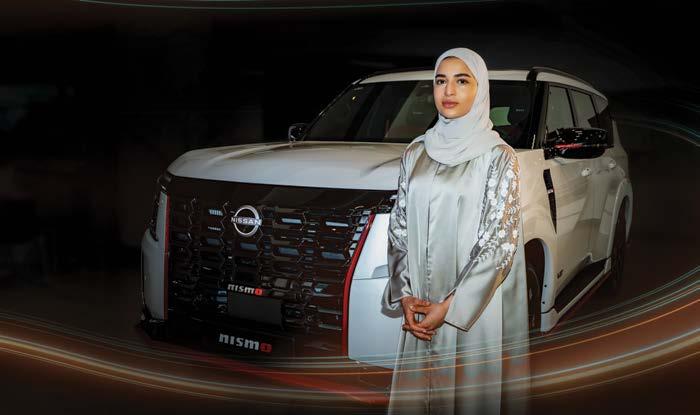
While Al Hosani is quick to acknowledge that the tools, policies, and resources offered by the UAE have catapulted the Emirati determination and will to induce transformation into every branch of the nation’s being, she also notes that none of this can happen without support systems and role models to light up untrodden paths.
“Pioneering Emirati women have served as a testament to the UAE’s unwavering commitment to empowering women across economic, cultural, scientific, and leadership domains reflecting the nation’s vision for inclusive, equitable, and sustainable development,” Al Hosani declares. “It is with pride that I share that Emirati women now
occupy 56% of science, technology, engineering, and mathematics (STEM) positions, and that they hold a literacy rate of 95.8% in the UAE. This advancement is propelled by visionary leaders such as H.E. Noura Al Kaabi, UAE Minister of State, and H.E. Fatima Al Kaabi, Director General, Emirates Drug Establishment and Chairperson, UAE BIOTECH Research Center, whose dedication to public service has been instrumental in building an inclusive, knowledgedriven society. In healthcare, pioneers like Dr. Farida Al Hosani [Deputy CEO of Abu Dhabi-based Global Institute for Disease Elimination], Dr. Maha Taysir Barakat [Assistant Minister for Health and Life Sciences at the UAE Ministry of Foreign Affairs], and
Dr. Fatma Al Attar [Consultant & Director of IHR at Ministry of Health - UAE] have all set new standards for medical excellence and public health leadership, both nationally and globally.”
“While I’ve had the privilege of learning from many remarkable women, it is Hessa Al Lootah, Project Manager at the Dubai Chamber of Digital Economy (DCDE), who stands out as a shining example of a youth innovation advocate,” Al Hosani says. “Through her role at DCDE, she has championed the values of purpose-driven innovation, fostering a culture of entrepreneurship and digital advancement that continues to shape and lead our nation’s future.”

ECOSYSTEM ENABLER
THE SUPPORT FROM OTHERS HELPED ME RECOGNIZE MY STRENGTHS AND UNIQUE TRAITS, WHICH FUELLED MY SELF-BELIEF AND RESILIENCE. THEIR ENCOURAGEMENT EMPOWERED ME TO USE MY ABILITIES IN WAYS THAT BENEFIT THE COMMUNITY AND ALLOW ME TO GIVE BACK TO MY COUNTRY. AS AN EMIRATI WOMAN, THIS CONSTANT PRESENCE OF SUPPORT HAS GUIDED AND STRENGTHENED MY GROWTH AND IMPACT.”
With a job that focuses on building Dubai’s digital business ecosystem from supporting startups and tech companies to grow, to creating programs that help young Emiratis develop future skills, Hessa Lootah, Project Manager at Dubai Chamber of Digital Economy, knows better than most how pivotal it is to have a north star in one’s entrepreneurial journey. But upon the pleasant revelation of high regard Mahra Al Hosani holds for her, she says: “For Mahra, her confidence and passion for the medical field was always evident. My role was simply to equip her with the right resources at key moments, allowing her strengths to flourish. Mahra since then has consistently moved forward without hesitation and achieved one success after another which has been incredibly rewarding.”
Over the past few years, Lootah has managed a range of initiatives designed to strengthen Dubai’s position as a hub for innovation and entrepreneurship. “This has
included developing capacity-building programs, delivering research on the digital economy, and working closely with international companies to guide their entry into Dubai from business setup to connecting with partners, investors, and clients,” she reveals. “As such, ‘Hand in Hand’ to me means being present through every milestone to offer guidance, support, and the right tools to ensure someone’s journey stays on track.
For fellow Emirati women who are paving their own unique paths, Lootah’s first piece of advice is to always share insights from one’s own expertise and field in order to give real-world perspectives to other up and coming female pioneers. “Also, encourage others to connect and network with a broad range of experienced individuals as that will provide mentees with exposure and visibility throughout their journey,” she continues. “Finally, remind them to focus on the impact of their contributions, because ultimately our aim should be for the greater good for our
HESSA LOOTAH IS PICTURED HERE WITH THE ALL-NEW NISSAN PATROL PRO-4X , WHICH IS A BLEND OF POWER AND PRACTICALITY. “IT’S A CAR KNOWN FOR ITS RESILIENCE AND MOVING FORWARD REGARDLESS OF OBSTACLES, WEATHER, OR CONDITIONS,” SHE SAYS. “THIS MIRRORS MY OWN APPROACH: WHEN I SET A GOAL, I PUSH THROUGH EVERY CHALLENGE UNTIL I ACHIEVE THE DESIRED RESULT.”
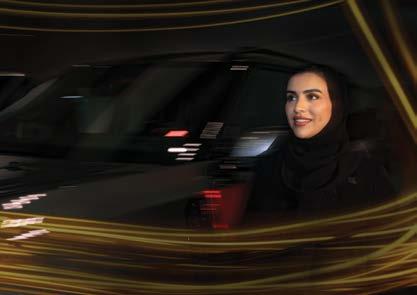
community and country, striving to reach global influence and recognition.”
In her expansive career so far, Lootah –who holds a bachelor’s degree in International Relations–has been an earnest seeker of knowledge. “I’m
passionate about continuous learning whether it’s technology, business, or leadership,” she says. “I’m also a member of the Dubai Chambers Youth Council. If I had to sum up my career so far, I’d say it’s about connecting people, ideas,
and opportunities to create meaningful impact for businesses, for the community, and for Dubai’s position globally.”
But through it all, there’s one lesson she says she’s learnt the hard way and would like to pass on to her fellow Emirati women. “No matter how driven you are to meet your targets or fulfil your ambitions, it’s vital to occasionally step back to relax, recharge, and gain fresh perspective!” she says. “This pause will allow you to notice what you might’ve missed, refine your approach, and ultimately create better outcomes. Learning to balance persistence with reflection is an essential lesson for anyone during their journey.”

AIDA AL BUSAIDY IS PICTURED HERE WITH THE ALL-NEW NISSAN PATROL ABOUT WHICH SHE SAYS, “IT’S MORE THAN A CAR, IT’S PART OF MY STORY.” AL BUSAIDY ADDS, "THERE’S SOMETHING DEEPLY EMIRATI ABOUT THE PATROL. IT’S A SYMBOL OF RESILIENCE, BUILT TO CONQUER DUNES AND NAVIGATE CITY STREETS WITH EQUAL POISE. LIKE ME, IT KNOWS THE VALUE OF HERITAGE—BUT ISN’T AFRAID TO EVOLVE. I LOOK FORWARD TO THE NEW PATROL WITH THE SAME ANTICIPATION I FEEL FOR EACH NEW CHAPTER OF LIFE—FAMILIAR, YET FULL OF PROMISE. BECAUSE JUST LIKE THIS CAR, I’VE LEARNED TO MOVE FORWARD WITH COURAGE, TO CARRY THE PAST WITH PRIDE, AND TO ALWAYS DRIVE TOWARD SOMETHING GREATER.”

Communications strategist and story teller Aida Al Busaidy has built a diverse career in communications, spanning public relations, internal communications, marketing, and events. Her expertise covers the entire spectrum—from conceptualizing logos and taglines, designing and writing invitations, to organizing and executing high-profile press conferences and events, as well as crafting impactful press releases. Beyond the corporate sphere, she has expanded her horizons into television presenting and column writing, deepening her engagement with the media and communications landscape.
Al Busaidy attributes her journey’s strength to a support system that has walked with her through
every high and low—bringing laughter, instilling belief, and offering steadfast encouragement. “I am deeply shaped by the women in my life—my mother, my aunts, my cousins, my sisters-in-law, my colleagues, and my closest friends,” she says. “They’ve walked beside me through highs and lows, reminding me of the power of resilience and unity. We share values, we share dreams, and we inspire one another to choose joy, no matter the circumstances. I also draw strength from women everywhere who embrace who they are fully and push through, regardless of the obstacles in their path.”
Here, Al Busaidy adds a reminder of the beautiful synergy that can come about when both genders are equally supportive of each other. “Just as importantly, I

“
AS WE MARK A DECADE SINCE THE INCEPTION OF EMIRATI WOMEN’S DAY, I CAN’T HELP BUT REFLECT ON HOW FAR WE, AS WOMEN, HAVE COME AND CONTINUE TO GROW —AND I ATTRIBUTE SO MUCH OF WHERE WE STAND TODAY TO THE VISION OF OUR LEADERS AND THE UNWAVERING GUIDANCE OF H.H. SHEIKHA FATIMA BINT MUBARAK, THE MOTHER OF THE NATION. THEIR BELIEF IN OUR POTENTIAL CONTINUES TO OPEN DOORS FOR US TO DREAM BIGGER, LEAD BOLDER, AND SHAPE THE FUTURE WITH CONFIDENCE.”
stand here because of the unwavering support of the men in my life—my husband and my boys especially, who believe in me unconditionally, and who inspire me every day to be better, stronger, and more fearless. They lift me up at every stage, reminding me why balance, empathy, and determination matter.”
Living in Dubai during decades of unprecedented growth has strengthened Al Busaidy’s confidence and equipped her with the skills to soar to new heights in her career. She reminds younger generations that they don’t need to shoulder everything to prove their worth. "In the early
days of my career, I believed I had to say yes to everything, do it all, and do it perfectly—, often without rest,” she explains. "I thought that was the only way to be seen, to be taken seriously, especially as a young Emirati woman stepping into rooms where not many of us were present. But over time, I came to understand that excellence is not about exhaustion—it’s about intention. It’s not how much you take on, but how wisely you choose where to place your energy. Saying “no” does not make you less dedicated; it makes you more powerful. Setting boundaries is not a weakness—it’s a form of self-respect, and a lesson in sustainability."
To every young Emirati woman starting out, Al Busaidy advises that "their voice holds value before it is ever echoed back." She adds, "You don’t need to overextend to earn your place. Step forward with clarity. Learn to protect your peace, honor your pace, and trust that being purposeful is more powerful than being everywhere. And remember: our ancestors taught us resilience not so we could burn out, but so we could rise with grace, again and again.”

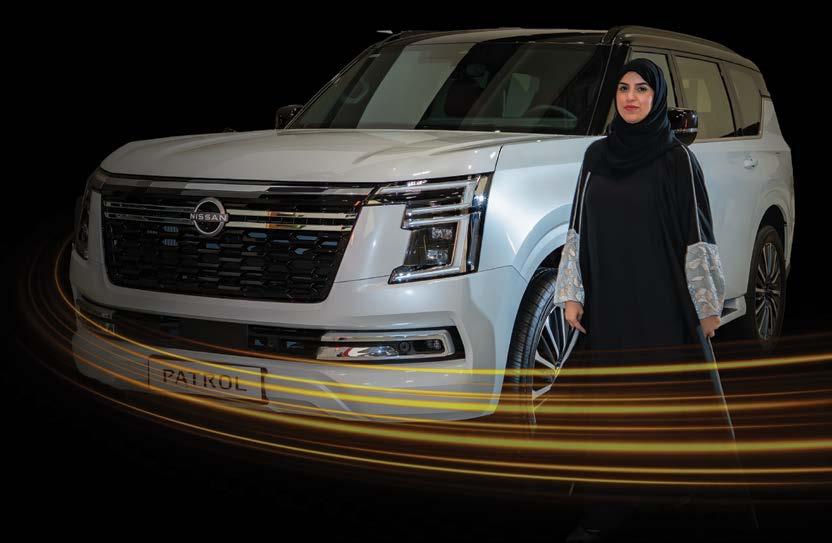
SUMEYA RAISI IS PICTURED HERE WITH THE ALL-NEW NISSAN PATROL, WHICH IS A BOLD VEHICLE THAT OFFERS A COMMANDING PRESENCE AND RUGGED SOPHISTICATION. “I CHOSE THE ALL-NEW NISSAN PATROL BECAUSE IT REFLECTS MY OWN SENSE OF PRACTICALITY. I ADMIRE THE PRESTIGE, POWER, AND LASTING VALUE IT REPRESENTS — QUALITIES THAT CONNECT STRONGLY WITH ME AS WELL!”
With over 14 years of experience in the banking and retail sectors, Raisi currently leads a team within the Priority Banking division of a leading financial institution, managing high-networth client relationships and ensuring the delivery of personalized financial solutions and exceptional service. Her career includes extensive experience in branch banking, covering customer service, operations, and sales. In addition, Raisi has worked in the retail
sector, specifically in shopping mall operations, where she was responsible for tenant management, facility coordination, and overall customer experience. This diverse background has strengthened her leadership skills and business acumen. "The belief of my support system in me helped me grow stronger and more confident, both personally and professionally,” Raisi says. “From encouraging me to aim higher as a student, to offering emotional support as a wife and mother, and
EXECUTIVE MANAGER Banking And Retail Sector
providing guidance and trust in my abilities as a banker — I’m truly grateful for the support that has shaped the person I am today."
Inspired by the support she has received, Raisi is deeply committed to giving back. She actively engages in initiatives that champion education, healthcare, and people of determination, reflecting her dedication to creating a meaningful impact both professionally and within the community.

Raisi has learned that nothing worthwhile comes easy. “Hard work, dedication, and intention are key,” she says. "Every young woman must choose whether she simply wants to go with the flow or strive to become someone who brings value to herself, her family, and her country." She adds that finding the right balance between work and personal life takes dedication, intention, and the courage to prioritize what truly matters. “There were times I prioritized my social life over work, which affected my performance and added stress,” she says. “Other times, I was so focused on work that I missed precious moments like my child’s first steps or a school concert — and that hurt deeply. It took time, reflection, and effort, but I eventually found a way to give the right attention, energy, and love to both my personal and professional life. Today, I can confidently say I do my best to keep my family, friends, and workplace happy.””
Raisi points out that every Emirati woman walks a different path — whether she’s a housewife, working professional, mother, or all
of the above — but her advice is the same for all of them.
“Work hard, be proud of what you do, and make sure your efforts benefit not only yourself, but your family — especially your children, who are the future — and your country. Everything we do contributes to preserving our values and building a better UAE."
“
MY JOURNEY WOULDN’T BE WHAT IT IS WITHOUT THE SUPPORT OF THE PEOPLE AROUND ME. IT STARTS WITH MY FAMILY — MY PARENTS, SIBLINGS, SISTER-IN-LAW, AND ESPECIALLY MY HUSBAND — WHO HAVE ALWAYS STOOD BY ME. ALONG THE WAY, I’VE BEEN FORTUNATE TO HAVE AMAZING FRIENDS, TEACHERS, AND MANAGERS WHO SUPPORTED ME THROUGH EVERY PHASE.”


MY JOURNEY HAS BEEN DEEPLY SHAPED BY THE UNWAVERING SUPPORT OF MY FAMILY AND CLOSE CIRCLE.”
SOCIAL MEDIA INFLUENCER AND ENTREPRENEUR
A true trailblazer in the UAE’s social media landscape, Al Sharif has evolved from being one of the country’s first influencers into a successful entrepreneur. After years in semi-government and government positions, she made a bold, life-changing decision to leave the corporate world and focus on building her own ventures. A fitness enthusiast and passionate collector of watches and handbags, Al Sharif has transformed her passions into thriving businesses, from founding an exclusive club for watch collectors to launching a

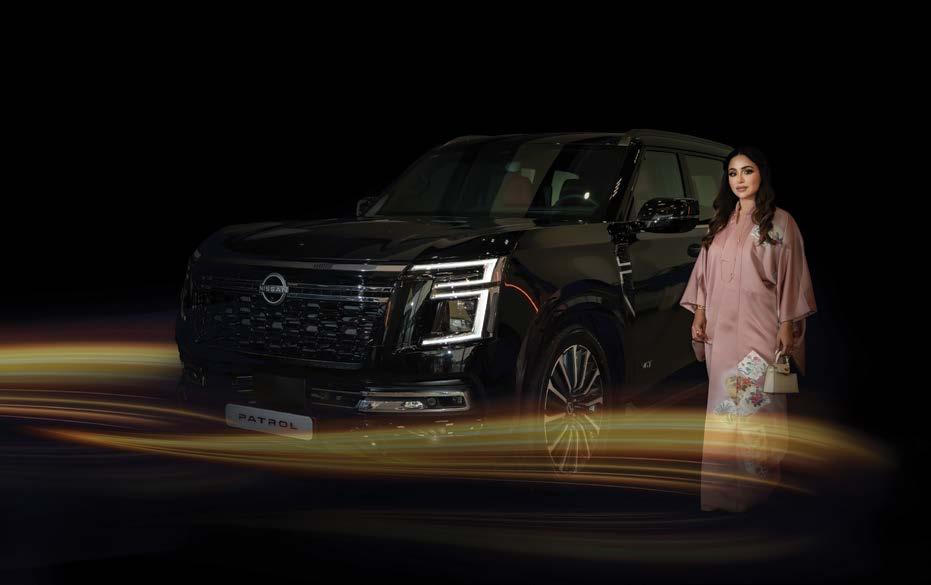
SHAMSA AL SHARIF IS PICTURED HERE WITH THE ALL-NEW NISSAN PATROL, WHICH OFFERS A BOLD DESIGN AND UNSTOPPABLE PRESENCE FOR THE STYLISH TRENDSETTER. “I’VE ALWAYS BEEN DRAWN TO FAMILY CARS FROM ARABIAN AUTOMOBILES COMPANY,” AL SHARIF SAYS. “TO ME, THEY REPRESENT RELIABILITY, COMFORT, AND A SENSE OF BELONGING—QUALITIES THAT MIRROR MY OWN APPROACH TO LIFE. JUST AS A FAMILY CAR BRINGS PEOPLE TOGETHER AND MAKES EVERY JOURNEY MEANINGFUL, I STRIVE TO CONNECT WITH OTHERS, NURTURE RELATIONSHIPS, AND CREATE LASTING MEMORIES. IT’S A REFLECTION OF THE WOMAN I AM TODAY—ELEGANT IN STYLE, GROUNDED IN PURPOSE, AND ALWAYS MOVING FORWARD WITH THE PEOPLE WHO MATTER MOST.”

social media, events, production, and consulting company, as well as her own fashion line. She is grateful for the support she received along the way.
“The encouragement of my family and close circle has given me the confidence to embrace challenges, stay true to my values, and
pursue my ambitions with purpose,” Al Sharif says.
"Knowing that I have a foundation of love and trust allows me to move forward with strength and grace."
Al Sharif believes the most powerful lesson for any young Emirati woman is to embrace her true self — because authenticity is the greatest strength of all.
"There will always be trends, expectations, and pressures to fit a certain mold, but staying true to yourself will open the right doors and attract the right opportunities. It’s not always the easiest path, but it’s the one that allows you to grow with integrity and live with pride."
FOUNDER
Itifaq Legal AI
MARYAM AL ANSARI IS PICTURED HERE WITH THE ALL-NEW NISSAN Z NISMO, WHICH FEATURES THRILLING POWER, RAZOR-SHARP PRECISION FOR THE TRUE PERFORMANCE PURIST. "IF MY LIFE’S JOURNEY WERE A ROAD TRIP, THOSE WHO KNOW ME BEST SAY I’D BE DRIVING THE ALL-NEW NISSAN Z NISMO. THEY SEE ME AS FAST-PACED AND ALWAYS ON THE MOVE, BUILT FOR THE COMPETITIVENESS OF THE ROAD AHEAD. IN THEIR EYES, I’M MEANT FOR THE SPOTLIGHT, CARRYING MYSELF WITH CONFIDENCE, BRAVERY, AND COURAGE. ABOVE ALL, I SEE MYSELF AS RESILIENT, NO MATTER WHAT HAPPENS I FIND A WAY TO STAND BACK UP SOONER OR LATE.”
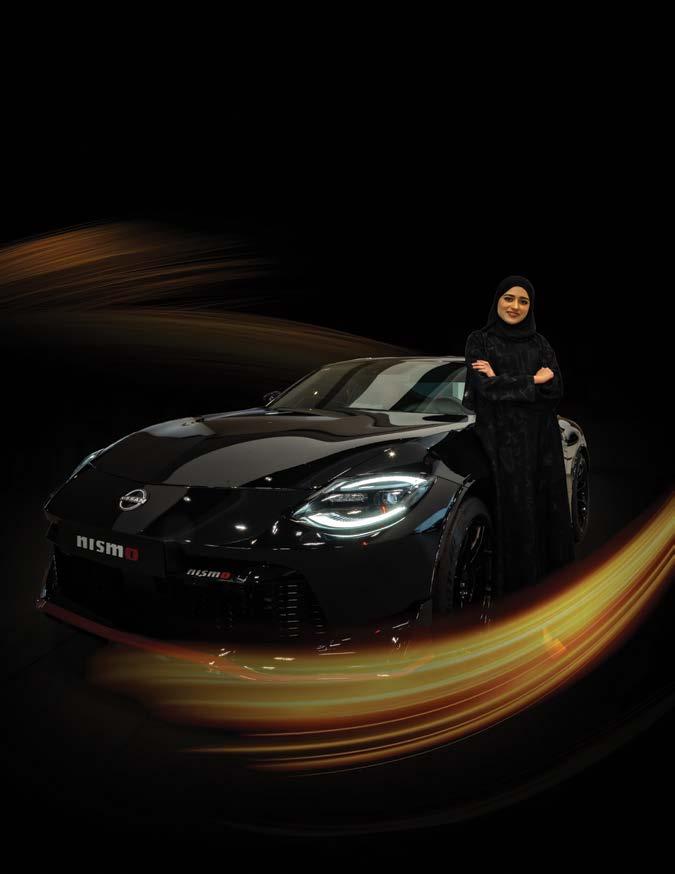
Maryam Al Ansari is the Founder of Itifaq, a legal tech AI company and curator of Global Shapers Sharjah Hub. She is also the producer and host of the Path Finders podcast where she thrives in having meaningful conversations.
Al Ansari’s advice to younger generations revolves around staying committed to their goals.
“Just keep going. If you keep striking a rock, it will eventually break,” she says. "You may need to change your angle, adjust your force, or even pick up a new hammer but persistence and resilience will always get you there. In the end, it’s not about how many times you strike, but about refusing to stop until the rock breaks.
She is dedicated to shaping the future of technology, empowering others through conversations, and evolving into the best version of herself every day. Looking

“
THE JOURNEY ISN’T ABOUT KNOWING EVERYTHING FROM THE START, BUT ABOUT SEEKING, LEARNING, AND DISCOVERING THE RIGHT ANSWERS ALONG THE WAY. AND DON’T FORGET TO ENJOY THE SMALL MOMENTS AS MUCH AS THE BIG ONES.”

back at her own journey so far, she’d advise her younger self to be patient.
"Some things take time, and failure is inevitable. You won’t always have all the answers and that’s okay,” Al Ansari says. "The journey isn’t about knowing everything from the
start, but about seeking, learning, and discovering the right answers along the way. And don’t forget to enjoy the small moments as much as the big ones. Looking back, I realize there were times I was so focused on the next step that I forgot to appreciate the present."
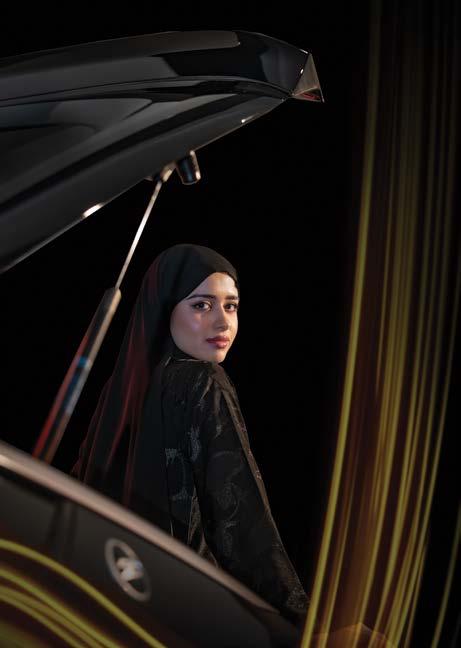
17-20 NOVEMBER 2025
Riyadh Exhibition & Convention Centre (Malham), Saudi Arabia
MOST ATTENDED REAL ESTATE EVENT



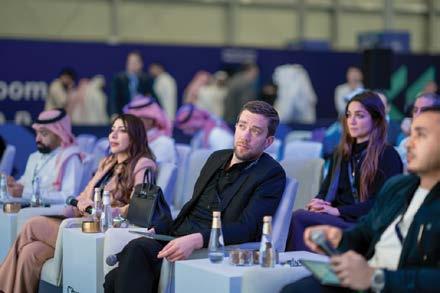
40 Countries Exhibiting
460+ Exhibitors
10 Country Pavilions
450+ Speakers
4 Stages


Gadgets and doodads that you might’ve missed out on, sourced by a tech aficionado. by
TAMARA CLARKE
/Honor Pad 10
Honor Pad 10 is a sleek new tablet boasting a 2.5K Honor Eye Comfort Display and is powered by the Snapdragon 7 Gen 3 Chipset. It’s equipped with a 12.1-inch TFT LCD 2.5K HONOR Eye Comfort Display and its screen-to-body ratio of 88% provides a more engaging and responsive visual experience. Powered by the Qualcomm Snapdragon 7 Gen 3 chipset, it offers smart features for a more intuitive user experience. The Honor Pad 10 also comes with a robust 10,100mAh battery so that you can focus on what matters most – productivity – without being tethered to a charging port. Designed for seamless

productivity, the Honor Pad 10 with MagicOS 9.0 (Android 15) offers tools like Honor Notes, Honor Docs, and AI Writing Tools, plus Honor Connect, Magic Portal, and Magic Capsule for an efficient, intelligent workflow. For example, the AI Writing Tools allow you to read and edit any kind of document. It supports a wide range of writing functions, including drafting text from scratch, polishing or rephrasing existing content, expanding ideas, and checking grammar and spelling across multiple languages. This tool is designed to help you complete better quality writing tasks faster.

Galaxy Z Flip7 is a compact AI phone with cutting-edge capabilities. Small enough to slip into your pocket, yet powerful enough to boost creativity, it’s powered by the latest 3nm processor and features two useful displays including the main display, a 6.9-inch Dynamic AMOLED 2X, built for an ultra-smooth, immersive experience and a 4.1-inch Super AMOLED FlexWindow with edge-to-edge usability that enables you to see and do more on the cover screen. With 2,600 nits of peak brightness and a smooth 120Hz refresh rate on both the main display and the FlexWindow, Galaxy Z Flip7 enables fluid scrolling, streaming and gaming.

The new Ring Outdoor Camera Plus features 2K video resolution, a wide field of view, and Low-Light Sight technology to deliver sharp, vibrant footage, using only ambient light sources such as street lamps. Designed for indoor or outdoor use, the new camera combines an upgraded imaging sensor and lens system with Ring Vision, which delivers industry-leading video quality and efficient video compression for both live streaming and recorded clips. Outdoor Camera Plus provides real-time motion alerts, Live View, and Two-Way Talk straight out of the box. With an optional Ring Home Basic subscription, you can receive alerts, access up to 180 days of event video history, and more. Ring Home Premium provides you with even more insight into what’s happening at your home or office with features like 24/7 recording. The camera also works with compatible Alexa-enabled devices for hands-free access to Live View, two-way communication, and more.

Plus, the FlexWindow makes it easy to type out quick messages, check schedules at a glance and snap high-quality selfies. Weighing just 188 grams and measuring only 13.7mm when folded, Galaxy Z Flip7 is the slimmest Galaxy Z Flip yet. The cover and back are protected by Corning® Gorilla® Glass Victus 2. The Armor FlexHinge is thinner than the hinge on the previous generation and features a restructured design and high-strength materials for smoother folds and long-lasting durability. The 4,300mAh battery is the largest ever on a Galaxy Z Flip, delivering up to 31 hours of video play time on a single charge.
TAMARA CLARKE, a former software development professional, is the tech and lifestyle enthusiast behind The Global Gazette, one of the most active blogs in the Middle East. The Global Gazette has been welcomed and lauded by some of the most influential tech brands in the region. Clarke’s goal is to inform about technology and how it supports our lifestyles. Talk to her on Twitter @TAMARACLARKE theglobalgazette.com
From better goods to better wardrobe bests, every issue, we choose a few items that make the approved executive selection list. In this edition, our picks are from AMADA and Orskin Aesthetics.
THOUGHTFUL DESIGN → Swiss-founded and female-led activewear label AMADA.
Entrepreneur Lesley Ryf launched the brand in 2020 from her family living room in Switzerland, and has since scaled it into a refined, slow activewear label with global distribution operating across multiple regions.
At its core, AMADA champions thoughtful, minimal design underpinned by Swiss values of precision, quality, and longevity. The collections are produced in Turkey in small runs, with restocks released on demand in response to real customer interest— eschewing fast fashion cycles in favor of deliberate, conscious production. Signature details include sculpted fits, built-in support, zero front seams (no camel-toe), and fabrics chosen as much for their durability and comfort as their performance.
The brand has built momentum through word-of-mouth and wellness-led activations in London, Zurich, and Dubai, with upcoming capsule launches that include a loungewear collection and an expansion into elevated lifestyle accessories. www.amadawear.com




INSTANT IMPACT ↓ Dubai-based Orskin Aesthetics presents Ultraformer MPT.
There’s a noticeable shift happening in aesthetics -clients are moving away from overfilled features and instead chasing definition, lift, and long-term skin health. Enter Ultraformer MPT – the newest evolution in non-surgical skin tightening, now available at Orskin Aesthetics and quickly becoming one of the most requested treatments.
Often dubbed the “no-filler facelift,” Ultraformer has long been a favorite of celebrities, like Kim Kardashian, Kourtney Kardashian, and Jennifer Aniston, for its ability to lift and sculpt without injectables. But the latest MPT model (micro
pulsed technology) takes things a step further –delivering faster treatments, less discomfort, and deeper synergy effects than previous HIFU devices.
“Our clients are asking for more regenerative, lowmaintenance treatments that work with their skin – not against it,” says Orsolya Matheisz (known as Orsi), founder of Orskin Aesthetics. “Ultraformer MPT is ideal for those who want visible results, especially in areas like the cheeks, jowls, and neck, without going down the injectable route.” orskin.ae
by DR. BERND VAN LINDER
We have all heard the buzzwords: digital transformation, digital banking, digital onboarding, you name it. Recently, I came across an industry report which discussed how 52% of financial institutions list enhancing digital experiences as their top priority. Amidst the rush to go digital, we rarely ask whether these enhancements actually serve the customer.
Today, you may not see too many people walk into a bank. About 77% of consumers prefer to manage their bank accounts through a mobile app or computer, unless you’re withdrawing or depositing large amounts of cash, which again is not a common sight as countries like the UAE are embracing a cashless economy. The standard today is to have an easy, personalised and
instant banking experience, without the constraints of traditional banking. I’d like to describe it as a ‘digital by design’ model.
But the same digital-first approach has at times caused customers to encounter poor digital experiences, whether during onboarding or other moments of the user journey. On the flip side, the demand for smoother, friction-less experiences
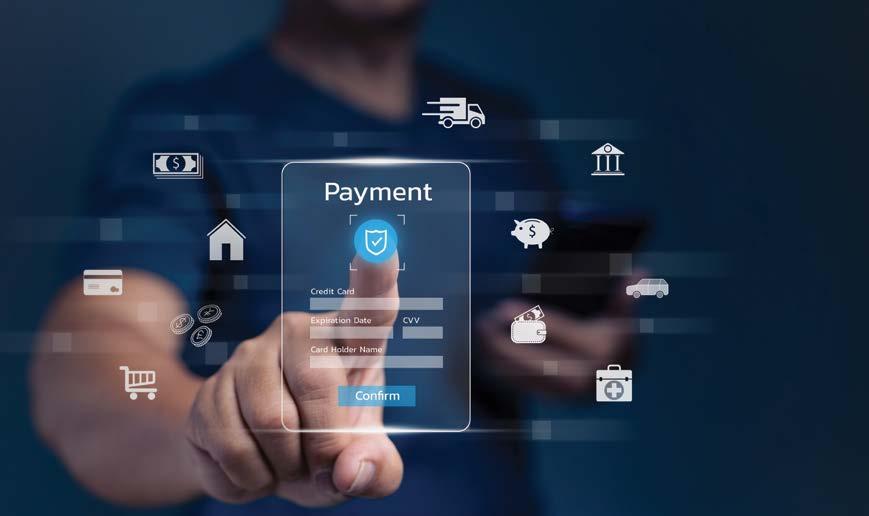
has never been higher, and this is partly accelerated by fintech innovators who are already offering simplified and faster digital onboarding and user journeys. To address this, banks today must pursue meaningful digital transformation that puts the customer at the heart of everything. Here are a few ways in which this can be achieved, from adopting a human-centred design approach to leveraging partnerships and contributing to national strategies that enable the creation of safe, people-first digital experiences.
LENS To really transform and at the same time exceed customer expectations, there must be a strong focus on human-centred design. In order words, embracing digital in a human way. Keeping up with the competition and keeping an eye out on the latest tech are important, but the ‘tech’ in question is redundant if it is not intuitive. Every interaction must be intuitive for the customer!
Currently, according to a 2024 research study based on insights of 2,000+ executives from financial firms and corporations, more than 50% of C-suite leaders are utilising technologies such as chatbots, personalised user experience, personalised marketing and customer segmentation tools to elevate customer experiences. While this is all great, to truly attract customers, one must think differently. Targeted, continual, and marginal improvements are critical to delivering experiences that surprise the customer when they log in. Their excitement about a new feature and the value it brings to the customer journey is what makes digitalisation truly personalised.
Before rolling out a new capability or digitalising a
Targeted, continual, and marginal improvements are critical to delivering experiences that surprise the customer when they log in. Their excitement about a new feature and the value it brings to the customer journey is what makes digitalisation truly personalised.
traditional one, it’s important to think backwards. Many banks typically spend time discussing new or revamped capabilities, conducting deep dives into available technologies, and then selecting what feels most appealing, or relying on guesswork about what might seem innovative to the customer. While banks may have insights into what customers need, it’s often the customers themselves who have a clearer view of the gaps and what needs to be addressed. So, start the digitalisation journey by listening to your customers, jointly coming up with the ideal customer experience, and then work backwards to determine which technologies are best suited to deliver it.
To drive effective digitalisation, partnerships with like-minded entities who share your vision to integrate ‘human’ into ‘digital transformation’ are important. For instance, CBD’s partnership with J.P. Morgan to integrate the Kinexys Liink application, Confirm, is a powerful step in reducing friction in cross-border payments and reinforcing customer trust through secure, real-time account validation. In another collaboration, we worked with VISA in 2024 to offer innovative and customer-centric solutions to CBD cardholders
across all segments. A fundamental part of this agreement was establishing a Centre of Excellence powered by Visa Consulting and Analytics (VCA), dedicated to accelerating and simplifying customer’s payment experiences. Forming such meaningful partnerships will enable banks to drive impact-led digital transformation that strengthens the customer experience.
In the race to be digital-first, we must not lose sight of being human-first, nor does it come by downplaying genuine customer connections. Every decision, every upgrade, every partnership must be rooted in the question: Does this genuinely serve the customer? Because at the end of the day, it’s not the feature-rich app or the most advanced AI tool that earns loyalty, but how intuitively, securely and meaningfully we serve our customers.

Dr. Bernd van Linder has served as the CEO of Commercial Bank of Dubai (CBD) since January 2017, overseeing the bank’s growth and strategic direction. Under his leadership, CBD has strengthened its market position, enhanced profitability and driven innovation, positioning the bank on a trajectory toward becoming a fully digital bank.
Lessons in taking an Emirati brand global. by
MOHAMED
AL FALASI
Istarted Saddle fueled by a deep passion for coffee, food, and the kind of warm hospitality that defines our Emirati culture. What began as a Dubai-based home-grown concept quickly grew into something more - an expression of my vision to deliver exceptional guest experiences, rooted in quality, craft, and care. With a background in business and finance, I saw an opportunity to combine thoughtful systems with genuine hospitality.
Today, Saddle has evolved from a local favorite into a global brand, with locations in cities like London, Cannes, Saint-Tropez, and Riyadh. Along the way, we’ve always made sure to stay true to our roots - offering curated experiences that make a lasting first impression.
This journey has taught me a few practical lessons about taking a concept beyond its borders - lessons I believe every entrepreneur should consider when building a brand with global ambition.
It’s one thing to create something exceptional in your home market, where customers understand the background, but

bringing that experience to a new culture is another challenge entirely. For us, it came down to knowing what’s non-negotiable: our core specialty coffee beans, carefully sourced from around the world. These core ingredients define the Saddle experience, and their quality is never compromised, no matter where we are.
At the same time, we allowed flexibility where it made sense - sourcing local eggs, cheese, and other fresh ingredients for our food menus. This not only helped us meet local regulations and supply standards, but also reinforced our commitment to high-quality, flavorful offerings that feel rooted in place. By holding firm to our essentials and adapting thoughtfully elsewhere, we’ve been able to expand to cities like London and Cannes while staying true to who we are.
CHARISMA. Every founder’s early energy is contagious, but energy alone won’t scale. When we moved from a single café to multiple locations and international openings, operational consistency became vital. We built simple, repeatable SOPs for food preparation, supplier onboarding, and customer service.
The aim was not to remove creativity and passion from the mix, but to give our teams guidelines so the brand promise could be delivered by anyone, anywhere. That meant investing early in staff training, clear recipe cards, and a small central team responsible for quality audits. The result: guests in Dubai and Cannes get the same reliable and memorable experience without the constant presence of the founding team.
THIRD, TREAT LOCAL PARTNERS AS YOUR MOST IMPORTANT MARKET INTELLIGENCE.
Expansion is as much about partnerships as it is about product. We collaborated with local suppliers, landlords, and hospitality operators who knew the customer, the regulations, and the logistics. Respecting their expertise saved us time and helped us avoid costly mistakes - from permits and customs issues to simple things like opening hour expectations and delivery windows.
}
Actionable strategies that helped Mohamed Al Falasi build Saddle into a global brand
}1. Define your identity
Write down the three non-negotiable things that define your brand - the heart of your offering that must never change. This is the anchor that preserves brand identity across markets.
}2. Build flexible menus and operations
Design your menu and processes so some parts can be swapped in or out depending on market realities (ingredient availability, dietary norms, price expectations) without changing the essential customer promise.
}3.Start small, learn fast
Trial with pop-ups or seasonal locations before committing to long leases. Our humble roots taught us to adapt quickly and learn with minimal sunk cost.
}4. Prioritize people and training
Create a short, sharp training program that captures your brand values and service standards. Invest in local managers; empathetic leadership scales better than imitated style.
}5. Use partnerships for market entry, not shortcuts
Choose partners who complement your limitations (legal, logistics, local marketing) and treat them as advisors, not just vendors.
}6. Set your prices with intention
Pricing is more than cost plus margin - it’s a signal of positioning. Test pricing tiers and offer a consistent value perception relative to local competitors.
}7. Respect local customs - then localize
You don’t need to alter your identity to be accepted. Find thoughtful ways to adapt your story - translate signage accurately, honor local dining habits, and consider a few menu items that speak directly to local taste preferences.
}8. Plan for currency and cashflow complexity
Multi-market cashflow requires different terms, taxation, and account structures. Keep finance simple at first and use local banking expertise to avoid surprises.
One reality worth noting: the world is more open than you might expect to a good story told honestly.
The appetite for Emirati creativity - through food, design, and hospitality - is growing. But success isn’t just luck; it’s the result of many small, thoughtful choices made early onand the right people making them together.
EXPANSION IS AS MUCH ABOUT PARTNERSHIPS AS IT IS ABOUT PRODUCT." "
In some markets, we adapted supply chains to include local producers, which improved freshness and resonated with customers who value locality and sustainability.
Behind every success story, no matter how small, is a team united by a shared goal. None of this would be possible without a group of people who are willing to go beyond their job descriptions, roll up their sleeves, and work side by side to bring Saddle’s vision to life. We’ve built a culture of dependability and shared ownership, and that, more than anything else, has fueled our ability to grow sustainably.
I’m proud to say that, with the full support of my team, we’ve reached key milestones - most notably, our first official franchise partnership with Emirates Leisure Retail (ELR). Through this collaboration, we’ve taken everything we’ve learned so far and are applying it to one of the busiest, most demanding environments: opening a Saddle location at Dubai International Airport (DXB). It’s a proud moment for all of us, and a powerful example of what’s possible
when the right people come together behind a shared vision.
And the journey doesn’t stop here. We’ve got more exciting news on the horizon, with further global expansions in the pipeline. The lessons we’ve learned through our early international openings have laid a strong foundation for what’s next - and I couldn’t be more excited about the direction we’re headed.

Mohamed Al Falasi is a UAE-based entrepreneur with extensive experience in Dubai Government and KPMG. His career blends his expertise in business with a strong passion for health and wellness, driving real estate, F&B, and hospitality ventures on an international scale.
Mohammed founded Saddle in 2017, followed by Feels Juice Bar & Kitchen, established in 2020. He is also the co-founder of RePresent, a leading UAE-based destination design, implementation, and management company. As a member of the Dubai Chamber, he actively supports diverse business communities across the UAE. He writes and speaks about entrepreneurship, hospitality, and brand expansion.
by JUSTIN HARPER
What began as a consumer electronics venture has evolved into a multi-sector enterprise spanning luxury real estate, sustainable farming, and bespoke lifestyle experiences. For
Rohit Bachani, co-founder of Merlin Real Estate and the wider Merlin Group, the journey has been less about a grand masterplan and more about spotting opportunities and acting decisively.

The Merlin Group has always been about creating value in industries that shape the future,” Bachani says. “When we co-founded Merlin Digital
back in 1997, the goal was simple – to bring high-end consumer electronics to the region and set new standards of technology. Our father, Hiro Bachani, who moved to the UAE in
1968, instilled a sense of resilience and adaptability in us, something that is ingrained in the core of what we do today.”
That foundation paved the way for a move into property. “The move into Merlin Real Estate in 2021 was a natural extension of that entrepreneurial spirit, driven by a deep understanding of the region’s transformation. But it was not part of a grand, pre-planned blueprint. We simply spotted an opportunity in an evolving market where the demand for smarter, more connected homes was rising,” he explains. “From there, we expanded into other verticals like Merlin Farms and Craft by Merlin, again guided by the desire to innovate, to lead, and to offer something genuinely unique.”
He adds: “While we did not set out to create this sprawling group, each decision has been grounded in the same principles of innovation, community, and doing things the right way. What started in electronics has become a holistic business model that integrates real estate, wellness, and technology, all while staying true to our roots here in Dubai.”
For Bachani, expansion is never about chasing headlines.
“Diversification at Merlin is never about following trends for the sake of







it. It is about meeting a growing demand, especially as the market matures and as the needs of ultra-high-net-worth individuals evolve.”
That shift in demand was clear in real estate. “We are seeing a real shift where people now want homes that are more than just luxury – they are looking for customized, tech-driven living spaces that reflect their personal tastes and lifestyles,” he says. “This desire for customization is at the core of our move into real estate, where we work not only on our own developments but also collaborate with industry giants like Emaar and Nakheel to market their properties with that same focus on personalisation.”
Merlin Farms was also born from this approach. “It combines aquaponics with cutting-edge technology to produce high yields with zero chemicals, meeting a critical demand for healthier living,” he explains. Meanwhile, Craft by Merlin “offers bespoke lifestyle experiences that reflect the hightouch, curated approach that our clients crave.”
The group’s real estate arm has a competitive edge, he believes, thanks to deep roots in Dubai. “My brother and I were born and raised in Dubai, so we have an intrinsic understanding of the city’s pulse and its potential. This is a place that has shaped who we are, and that connection gives us an edge in how we approach real estate here. We are not just selling properties; we are creating the spaces where the future of Dubai will unfold.”
Bachani is frank about the realities of competition in the UAE property market. “The market here is dynamic and highly competitive, but what sets Merlin Real Estate apart is that we build with an eye on the long term. We collaborate with established names like Emaar and Nakheel to offer properties that
resonate with today’s discerning buyers, many of whom are no longer treating Dubai as a ‘Plan B’ location, but Plan A for living, investing, and building their futures.”
Sustainability and proptech have been part of that strategy, accelerated by challenges such as Covid-19. “Like every entrepreneur, I had to pivot quickly. The world had changed overnight, and so had the needs of our clients and teams. But what we have always believed in at Merlin is that innovation is a key to overcoming challenges. We did not just adapt; we looked for ways to push boundaries.”
The wellness movement is also shaping the business. “The demand for wellness and conscious living has changed the way we think about everything we do, from Merlin Farms to our real estate projects. Buyers are looking for more than just a beautiful home; they want properties that align with their lifestyle values. Whether it is smart home technologies, energy-efficient designs, or eco-friendly materials, the wellness trend is infiltrating every aspect of property design.”
On the wider luxury real estate landscape, Bachani observes: “The most notable trend is that Dubai is now Plan A, not Plan B. We are seeing younger, more sophisticated buyers, particularly from India and Pakistan, who are increasingly savvy and tech-driven in their approach to real estate. They no longer just buy a property for the sake of ownership; they are making calculated investments with an eye on returns, customisation, and the future.”
Maintaining quality across different sectors comes down to alignment, he says. “Consistency and quality come from clarity of vision. We do not just focus on the product; we focus on the experience, and how it will resonate with the people who interact with it. The success of Merlin Real Estate, Merlin Farms, and the rest of our ventures lies in a deep, shared understanding of our
mission, and in giving the right teams the freedom and resources to execute on that vision.”
For those starting out, his advice is pragmatic: “Start early, start small, and never fear failure. Mistakes are inevitable, but they are also the best teachers. The key is to learn quickly, adapt, and always stay focused on your end goal. You will face obstacles, but it is how you respond that matters. And remember, real success does not happen overnight. Stay curious, be disciplined, and trust the process – that is what will set you apart.”
“The demand for wellness and conscious living has changed the way we think about everything we do, from Merlin Farms to our real estate projects. Buyers are looking for more than just a beautiful home; they want properties that align with their lifestyle values.”
PayPal, the world's leading digital payments platform, has announced the establishment of its regional headquarters in the United Arab Emirates, joining a growing list of multinational companies choosing Dubai and Abu Dhabi as bases for expansion across the Middle East, Africa, and South Asia.

The move reflects the UAE's growing stature as a preferred hub for global corporations, driven by its strategic location, advanced financial infrastructure, and business-friendly regulations. Alongside PayPal, other major firms such as telecom operator Veon and private equity giant Fortress have also set up operations in the country, signaling a broadening of its financial and technology ecosystems.

Industry analysts note that PayPal's presence is particularly significant for the UAE's digital economy, as it strengthens the country's fintech landscape and expands opportunities for e-commerce, startups, and cross-border trade. With digital payments adoption accelerating across the region, PayPal's entry is expected to enhance consumer trust, improve merchant services, and stimulate innovation in areas such as digital wallets, remittances, and small business solutions.
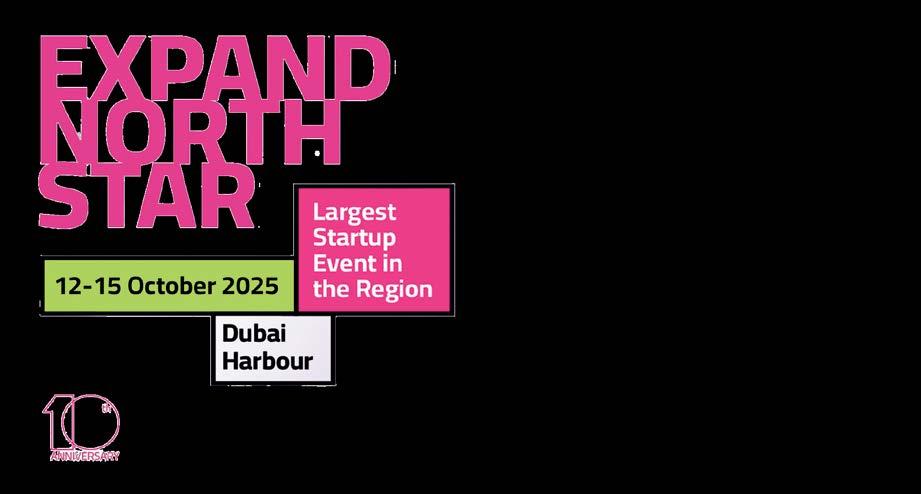


As a celebration of the MENA region's tech and innovation ecosystem, the 2025 Tech Innovation Awards will be staged by Entrepreneur Middle East on September 25, 2025, with the event highlighting the individuals and enterprises that are shaping the future of this dynamic industry.
The deadline for nominations is September 18, 2025, and they can be submitted on the Tech Innovation Awards website in the following categories:
• Best Digital Transformation
• Logistics Company of the Year
• Best Fintech Innovation
• Healthtech Company of the Year
• Construction Innovation
• Entertainment Platform of the Year
• Best Tech Solution Provider
• HR Software of the Year
• Digital Bank of the Year
• Proptech Solution of the Year
• Foodtech Company of the Year
• Blockchain Innovation of the Year
• Ecosystem Enabler of the Year
• Best Agritech Innovation






Now you can fly Emirates to Hangzhou, one of the seven ancient capitals of China. Explore its vast history and culture, and experience the famous West Lake, an inspiration for generations of artists and poets. Fly in comfort all the way with our world-class service. Indulge in delicious regional meals and recline to hours of award-winning entertainment.

